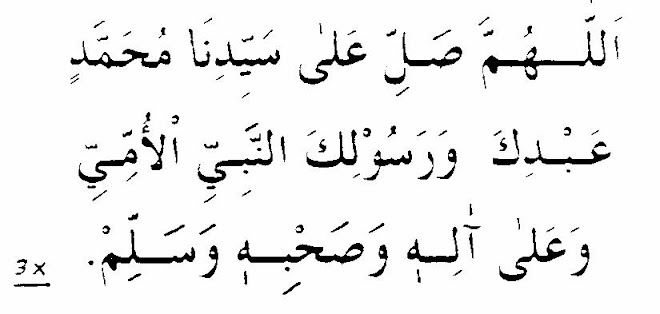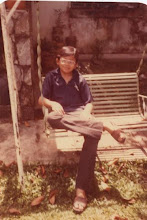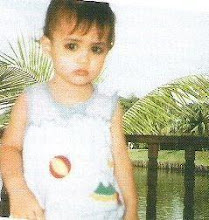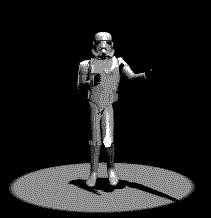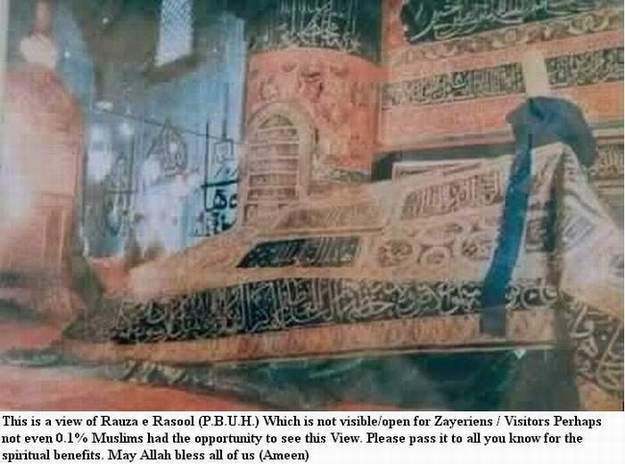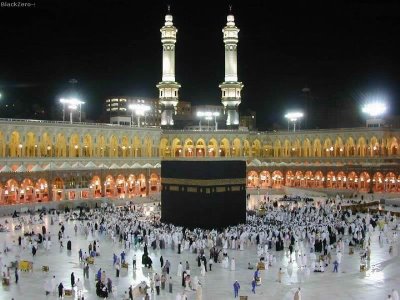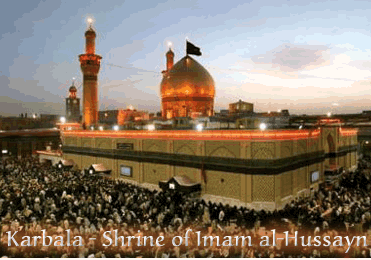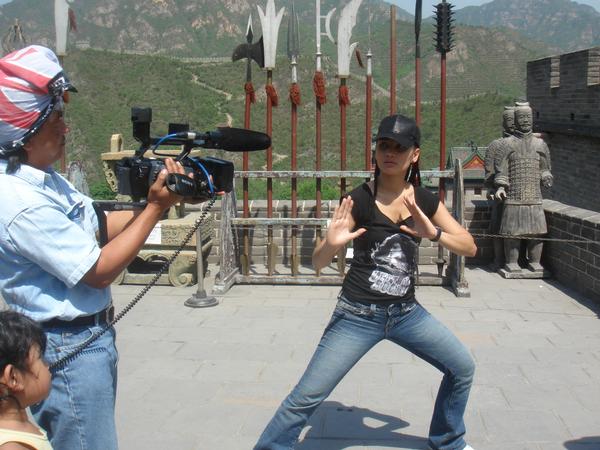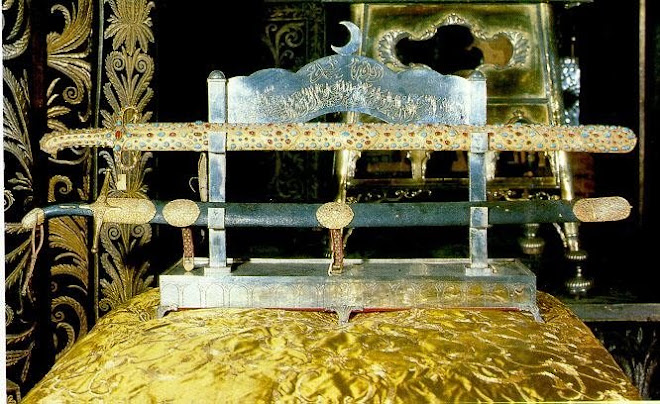Tuesday, July 28, 2009
Sunday, July 26, 2009
Friday, July 24, 2009
Imam Mahdi (A.S.) in the Eyes of Muslim Ascetics


The subject of al-Mahdi (A.S.)is not restricted to the school of the Ahl al-Bayt, peace be upon them, rather, it is an object of interest for all Muslim schools of thought. Many great Muslim scholars urged by the numerous traditions related from the Prophet of Islam have investigated this subject and have written many books on it.
Muslim mystics, based on the existing traditions and their special views on existence and creation, have treated the question of al-Mahdi (A.S.)from their own particular perspective. Monotheism and knowing the Perfect Man, who is the true monotheist, are the very foundations of all questions and knowledge for the mystic. From the viewpoint of the great sages among the people of intuition, the Perfect Man is the bezel in the ring of the order of creation and the preservation of the world and mankind are dependent upon his existence.
The People of Meaning assert that the Perfect Man should also have an elemental existence throughout the ages so that the world and man are maintained in the light of his being. They have spoken of such a man on different occasions and under different names.
The great mystic Aziz al-Din Nasafi, in his book Al-Insan al-Kamil (‘The Perfect Man’), writes: “Now know that this Perfect Man has many names, including Hadi (the guide), al-Mahdi, Imam, Caliph (or Khalifah, successor), and Sahib al-Zaman (Lord of the Time).” He further adds:
"This Perfect Man has always existed in the world, and He is no more than one. For, if we take all the beings of the world as one person, the Perfect Man will be the heart of that person, and a creature without a heart cannot live. Therefore, the Perfect Man always exists in the world, and He cannot be more than one."
Muhyi al-Din ibn Arabi also in ‘The Bezel of Adam’ holds that caliphate is confined to the Perfect Man, and states that “Succession (khilafat) cannot be true except for the Perfect Man.” Of course, it must be noted that from the viewpoint of the mystics, the ‘Qutb’ (the Pole) in the world of existence is like the spirit in the body, and ‘Hadi’ and Mahdi bear the same meaning of the ‘Qutb’.
Sheikh 'Ali Akbar ibn Asad Allah ibn 'Amr Allah al-Mawdudi, a well-known Indian scholar, in his Yawaqit (‘Emeralds’), Question 45, relates that Al-Sharani has said:
"Sheikh Abu al Hasan al-Shadili, may Allah be pleased with him, has said that the ‘Qutb’ or the Perfect Man is described by fifteen signs. These include the fact that he should be characterized by infallibility, mercy and succession, he should strengthen the Carriers of the Throne, and the truth of humility should be revealed to him. He should also be familiar with all the Divine Attributes. Then he explains the foregoing according to what is held by those who believe that other than the Prophet can also be infallible, and that those who confine infallibility to only certain people and deny it to others have strayed from the way.
Imam al-Mahdi (A.S.)from the Viewpoint of Sheikh Muhyi al-Din ibn Arabi Muhyi a1-Din ibn al-Arabi al-Ta’i is a mystic, philosopher and theologian. He was born in Murcia, Andalusia and settled and died in Damascus in 638 A. H. He wrote numerous books, some of which are al-Futuhat al-Makkiyah, Muhadarat al-Abrar, Fusus al-Hikam, al-Tajalliyyat al-Illahiyya, some poetical works and many others.
Muhyi al-Din speaks about the Mahdi in the Futuhat, and on different occasions. In chapter 366, for example, he writes:
Know that al-Mahdi (A.S.)must come, but he will not come until the earth is filled with injustice and oppression. He will fill it with justice and equity. Even if there remains a single day of the world, God will extend that day until that Caliph(successor) comes to Caliphate (ruling as a caliph).
Al-Mahdi (A.S.)is of the progeny of the Messenger of Allah and of the descendants of Fatimah, peace be upon her. His grandfather is al-Husayn ibn 'Ali ibn Abi Talib. His father is al-Hasan al-Askari, the son of Imam 'Ali al-Naqi, the son of Muhammad al-Taqi, the son of Imam 'Ali al-Rida, the son of Imam Musa al-Kadim, the son of Imam Ja‘far al-Sadiq, the son of Imam Muhammad al-Baqir, the son of Imam 'Ali Zayn al-Abidin, the son of Imam al-Husayn, the son of 'Ali ibn Abi Talib, peace be upon him.
His name is the same as the Prophet’s name and the Muslims will pledge allegiance to him between Rukn and Maqam. He is like the Prophet and is similar to him in temperament, for no-one is closer to the unparalleled temperament of the Prophet (“Indeed you possess a great character” al-Qalam: 4) than his eminence Furthermore, Muhyi al-Din in al-Manaqib (‘The Virtues’) speaks of the excellences of al-Mahdi (M.A.H.H.A.):
"Ali is the Secret of the Eminent Secrets, the Hidden Soul of the Holy Souls, the Ladder of the Intellects, the Accomplishment of the Principles, the Pole of the Millstone of the Existence, the Centre of the Circle of the Revelation, the Perfection of the Creation and the Origin of the Perfection, the Beauty of all and the Gathering Place of the Existence, the Known and Existing Knowledge. Questions turn to him, he whose birth is well-known. He is parallel to the Prophetic Mirror, the Verifier of the Appeasing Secrets, the One Embellished by the Divine Lights, and the One Nourished within the Lordly Veils. He emanates truths by his existence, and splits subtleties by his revelation. He is the Greatest Divine Name, containing the Infinite Modes of the Creation, the Endless, the Diver into the Merciful Ocean, the King of Compassionate Bounties, the Mountain of Godly Manifestation, the Fire of the Corporeal Tree, the Law of the great Allah, the Ultimate Goal of mankind, the Father of the master of the Time, the one of who is the Refuge of the Truth, the Organizer of the hidden and known places of order, Abu al-Qasim Muhammad ibn al-Hasan, peace be upon him."
That which has been mentioned here are the attributes, the virtues and the lineage of his eminence as well as a depiction of his government at the time of his appearance. These have been taken from widely transmitted narrations found in the recorded traditions of the Islamic schools of thought. Moreover, ibn Arabi in the second volume of al-Futuhat explains the subject mentioned above in answer to a few questions put by Al-Hakim al-Tirmidi and claims that the Seal of Sainthood (wilayat) is alive and he had the honour to be in his presence.
Of course, ibn Arabi divides the seal of sainthood into the seal of general sainthood and special sainthood. He holds that Jesus (p.b.u.h.) is the Seal of General Sainthood and al-Mahdi(A.S.)is the Seal of Muhammadan Sainthood and of Special Sainthood. In this article I do not intend to criticize his views, therefore, I refer the reader to Sayyid Haydar Amuli’s Jami‘al-Asrar (‘The Compendium of the Secrets’), who, despite his deep respect for ibn Arabi, criticizes the latter’s discourse on sainthood.
There are elegant poems in his book, al-Futuhat al-Makkiyah expressive of his devotion and respect for al-mahdi (A.S.) Sheikh Mahmud Shabistari and Sheikh Muhammad Lahiji Sheikh Mahmud Shabistari is the author of the mystical ode Golshan-e Raz (‘The Rose Garden of the Secrets’). This book is counted as one of the most excellent of mystical books which has guaranteed its author eternal fame. Many commentaries have been written on the poem, of which the commentary of Sheikh Muhammad Lahiji is one of the best.
Lahiji argues that: The Saint (wali) follows and obeys the Prophet both in ease and adversity and in contraction and expansion, and attempts, struggles and shows obedience in the way. Because of this, he is ordered to observe all (the religious) commandments and abstain from all that is forbidden, and in respect of Divine law and spiritual discipline has become who shares secrets with the Prophet. Since the Prophet has attained the rank of the Beloved, so also will the Saint move from the rank of a lover to that of a beloved by carefully following the Prophet. For the attribute of being dearly loved will flow from the Prophet into the Saints because of the latter’s obedience. As well, he will achieve an intimacy with the Prophet, sainthood and close proximity to God. This is as the Messenger of God has said,
“'Ali belongs to me and I belong to him. 'Ali and I have been created from a single light. You ('Ali) are to me as Aaron is to Moses except that there would be no Prophet after me.”
Sheikh Mahmud Shabistari writes: Sainthood assumes various manifestations according to different dispositions and capacities to the extent that they become innumerable… The highest and most perfect manifestation of this sainthood appears in the perfect being of the Seal of the Saints, for he is the manifestation of absolute sainthood, whereas the rest of the saints in their various ranks derive the light of sainthood from the lamp of the Seal of the Saints.
Sheikh Muhammad Lahiji in his commentary on the speech of Mahmud Shabistari writes: The Seal of the Saints is the manifestation of all sainthood. It is the perfection of the community, as the perfection of the reality of the circle is manifested in the last point. The Seal of the Saints is Imam Muhammad al-Mahdi (A.S.)who has been promised by the Prophet, peace be upon him and his Household, who has said,
“Even if there remains only one day of the world, Allah will extend that day until He sends a man from my progeny or from my Household. He will fill the earth with justice and equity as it has been filled with injustice and oppression.” He further states, «المهدي من عترتي من اولاد فاطمة» “Al-Mahdi (A.S.)is from my progeny, and he is of the descendants of Fatimah.”
Within the circle of absolute sainthood, which is manifested by the Seal of the Saints, the saints are all like points or the different limbs of the Seal of the Saints. This is because the reality of sainthood is realised by one of the attributes of perfection in each of the saints, and by all the attributes (manifested) in the last point which is Muhammad al-Mahdi(A.S.)The circle of sainthood is manifested and becomes actualized in this last point. Just as all the Prophets, peace be upon them, derive the light of legislative prophethood from the lamp of the prophethood of the Seal of the Prophets, similarly all the saints derive the light of sainthood and perfection from the sun of the sainthood pertaining to the Seal of the Saints. This is why the sainthood of the Seal of the Saints is called Solar Sainthood while the sainthood of other saints is called Lunar Sainthood. For all saints take the light of their sainthood from the absolute sainthood of the Seal of the Saints as the moon takes its light from the sun.
Abd al-Razzaq al-Qasani in his commentary on the speech of ibn Arabi also writes: It points to the fact that in matters of the religious law the Seal of the Saints must be a follower, just as al-Mahdi (A.S.)who will come at the end of time, is a follower of Muhammad, peace be upon him, in matters of the religious law and in the fields of real knowledge and sciences. All the rophets and Saints would follow him, and this would not contradict what we have said, for his inner being is the inner being of Muhammad, peace be upon him. This is why it is said that he is one of the good deeds of the Lord of the Prophets, peace be upon him, who has said, «ان اسمه اسمي و كنيته كنيتي فله المقام المحمود» “His name is my name and his nickname is my nickname, and he has a praised position.”
He also in Tuhfat al-Ikhwan fi Khasais al-Fityan (‘The Gift of the Brothers on the Characteristics of the Generous) writes: Just as Adam, the Chosen by Allah, is the beginning and manifestation of Prophethood, Abraham, the Friend of Allah, is its Pole, and Muhammad, the Beloved of Allah, is its Seal; so too is Abraham the beginning of the Generosity, 'Ali, the Commander of the Faithful, is its Pole, and Muhammad al-Mahdi, peace be upon him, is its Seal, and he is the Seal of the Saints.
As is clearly seen, in these eloquent words, reference is made to two important points about al-Mahdi (M.A.H.H.A.): first his being the Seal of the Saints, and second his position in relation to all other messengers of God.
Khwajah Muhammad Parsa in Fasl al-Khitab (‘The Distinction of Speech’), says: Because Abu Abd Allah Ja‘far ibn 'Ali al-Hadi, may Allah be pleased with him, thought his brother Abu Muhammad al-Hasan al-Askari had no son, and claimed that his brother has trusted him with the Imamate of the Muslims, he is called ‘the Liar’… Abu Muhammad al-Askari introduced his son Muhammad, may Allah be pleased with both of them, to the trustworthy and the dependable members among his Household and companions.
Then he narrates the tradition of Hakimah, the aunt of Imam al-Askari (p.b.u.h.), about the birth of the Imam of the Time and at the end he states: "Imam al-Askari said to me, "O my aunt! Take this child to his mother." I returned him to his mother. The other day when I came to see Imam al-Askari (p.b.u.h.), I saw the child with him, and he was so bright that he enchanted my heart. I said, "My lord! Do you know this blessed child?" He said, "My aunt! He is the one who should be waited for, he is the one about whose coming we have been given good tidings."
Then Hakimah added: "I fell in prostration and thanked Allah. Then for sometime I used to frequent the Imam’s house, but I did not see him. One day I said to the Imam, “My lord! What did you do with my lord, the Awaited One?” He replied, “We trusted him to That with Whom the mother of Moses trusted her son.”"
He further writes: "The traditions in this regard are countless. The virtues of al-Mahdi(A.S.)the Hidden from the Eyes and the Lord of the Time…are numerous. We have recurrent narrations that he will appear, and the light of his existence will shine everywhere; he will revive the religion of Islam and fight in the way of Allah…. His companions are free from any flaw or defect; they pass their days as he does, and they attain the truth with his guidance. Moreover, the caliphate and sainthood will end with him. He is the Imam from the death of his father to the Day of Resurrection. Jesus will stand behind him in prayers and will confirm his claim; he will call people to his religion, which is the religion of Islam."
Mawla Jami Noor al-Din Abdul Rahman In Shawahid al-Nubuwwah (‘The Evidence of Prophethood’), Jami introduces the Son of al-Hasan al-Askari as the Twelfth Imam; and describing the wonderful events of his birth and some of his miracles, states that he is the One who will fill the world with justice and equity. In this book, at the end of his account of the life of the Infallible Imams, he writes that Muhammad ibn al-Hasan ibn 'Ali ibn Muhammad ibn 'Ali al-Rida, may Allah be pleased with them, is the Twelfth Imam and his nickname is Abu al-Qasim and his titles include the Proof, the Awaited Imam and the Lord of the Time.
‘Arif Abd al-Rahman He is one of the masters of the Sufis and is the author of Miraat al-Asrar (‘The Mirror of the Secrets). As is quoted in Kashf al-Astar (‘Unwrapping the Veils’), he explains his views on the Twelfth Imam, the Promised al-Mahdi (M.A.H.H.A.):
"Here we state that the Sun of the Religion and the Fortune of that Guide of the people and the kingdom, the Pure Successor of Ahmad, the True Imam Abu al-Qasim Muhammad ibn al-Hasan al-Mahdi, may Allah be pleased with him. He is the Twelfth Imam among the Imams of the Household of the Prophet. His mother is (Umm Walad) and her name is Narjis. He was born on Thursday night, the fifteenth of Ramadan, 255 AH, or, according to the version given in Shawahid al-Nubuwwah, on 23rd of Ramadan in Samarra in 258 AH. The name and the agnomen of the Twelfth Imam are the name and agnomen of the Prophet. His sacred titles are al-Mahdi, al-Hujjat (the Proof), al-Qa‘im (the One who Rises), al-Muntadar (the Awaited One), Lord of the Time, and the Twelfth One who Rises. At the time of the death of his father, Imam al-Hasan al-Askari, he was five years old, and he became Imam at that age, just as God the Exalted had given John, son of Zachariah, wisdom and honour during childhood, and elevated Jesus the son of Mary, peace be upon him, to a high rank when he was only a child."
He adds that “His miracles are so many that they cannot be counted in this small space.” Then he refers to a narration which has been related by Mulla Abd al-Rahman al-Jami in Shawahid al-Nubuwwah through Hakimah, the sister of Imam 'Ali al-Naqi, the aunt of Imam al-Hasan al-Askari, and he discusses the birth of his eminence which has been already covered.
Sa‘ad al-Din Muhammad ibn al-Muayyad al-Hamawi He was born in 587 AH and died in 650 AH. He is an Iranian mystic who was widely acclaimed by his contemporaries. Explaining his views on the Guardian, the saints and Imam al-Mahdi(A.S.)he writes:
"And when it was the turn of the religion of Muhammad, he said, "After me there would be no Prophet to call people to my religion. After me there will be those who follow me and are close to God. They are called the Saints. These Saints will call people to my religion." and from that time the term ‘wali’ or ‘guardian’ came to be used in the religion of Muhammad. Allah, the Exalted has chosen twelve persons among the community of Muhammad, brought them close to Him, conferred His special sainthood on them and made them the Successors of Muhammad. The sentence, «العلماء ورثة الأنبياء» “The Scholars are the heirs of the Prophets” has been said in relation to these twelve persons, and, likewise, the statement, «علماء أمتي كأنبياء بني اسرائيل» “The scholars of my community are like the Prophets of the Israelites.” However, the last, who is the Twelfth Guardian, is the Seal of the Saints and is called al-Mahdi(A.S.)and Lord of the Time."
Sheikh Farid al-Din Attar Neishaburi Sheikh Farid al-Din Attar Neishaburi abu Hamid - or Abu Talib- Muhammad, son of Abu Bakr (died in 618 A.H.) is a famous Hanafi mystic. He wrote books both in prose and verse. His Tadhkirat al-Awliya (‘The Biographies of the Saints’), which is about the life-stories of the mystics, is counted as an authentic reference and document, and his Mantiq al-Tayr (‘The Discourse of the Birds’) is a monumental mystical work. In his Madh-har al-Sifat (‘The Manifestation of the Attributes’), he praises the great Prophet of Islam and his Household in verse, and at the end he praises the Lord of the Time.
It is interesting to know that it has been reported that this great man of letters has never praised any of the kings or princes of his time. In fact, one cannot find one piece of writing in all his works praising anybody else. Nevertheless, he has composed this excellent eulogy about the Imams of Shiism (peace be upon all of them). He has also composed other interesting odes in praise of Imam 'Ali, Master of the Virtuous (peace be upon him).
Mawlana Jalal al-Din al-Balkhi Jalal al-Din Muhammad Balkhi al-Rumi, known as Mawlawi (died in 672 A.H.) is a distinguished and great Hanafi mystic and poet. He is the author of the Mathnawi and is thought to be one of the greatest mystics and geniuses of the Muslim world. His Mathnawi is a mine of wisdom and knowledge. His other work, the Diwan-e Shams, contains his odes.
In his Diwan-e Shams Mawlana reveals his belief in the position of the Infallible Imams one by one, and after praising the Commander of the Faithful and his sons, composes some exhilarating verses in his enthusiasm for the appearance of the Hidden Imam.
Among those Sunni writers and scholars who are mostly credited as literary rather than mystic and have mentioned al-mahdi(A.S.)in their works, we can enumerate the following:
Haskafi Hanafi Abu al-Fadl Yahya ibn Haskafi is a distinguished scholar of the 6th century A.H. who died in 551 A.H. Yaqut al-Hamawi talked about his life in Mu‘jam al-Udaba (‘Dictionary of Literary Men’). Haskafi is probably one of the first men who calls Imam al-Mahdi(A.S.)in poetical language, by the name of “the Twelfth Imam” and as “that al-Mahdi in whom the Shiites believe”. In a long ode written in eloquent Arabic, he declares the Sainthood of the Ahl al-Bayt and the leadership of the Twelfth Imam, al-Mahdi (A.S.)
This ode has been cited by ibn al-Jawzi al-Hanafi in 'Al-Muntazam', vol.3, page.183, by ‘Imad al-Isfahani in his book 'Kharidat al-Asr' and by Shams al-Din ibn Tulun in his book 'al-A'immah al-Ithna ‘Ashar'.
Shams al-Din ibn Tulun Shams al-Din ibn Tulun (died in 955 A.H.) was a Sunni scholar who focused on the literary sciences as well as the Islamic sciences current in his day. He had a high rank among the learned people of Damascus and loved the Infallible and Purified Members of the Prophet’s Household very much. He wrote a book entitled al-A’immah al-Ithna ‘Ashar’ to introduce the personalities and lifestyle of the Prophet’s Household along with comprehensive issues concerning each one of the Twelve Imams (peace be upon them). This book was edited by a famous Sunni scholar named Salah al-Din Al-Munjid (the author of the distinguished book ‘The Role of the Church in Arabic Countries’) which was published by Dar al-Sadir in Beirut in 1958. An interesting point is that he mentioned therein some matters about the Promised Imam al-Mahdi (A.S.)from Sunni sources under the title “Number 12”.
He composed an excellent poem of six verses in the final section of the aforementioned book showing his love, faith and sincerity towards the Twelve Imams encouraging people to follow the Prophet’s Household.
Ahmad Jami (the Sheikh of Jam) Ahmad Jami (died in 536 A.H.) known as Sheikh al-Islam and sometimes called Jendepeel, the Sheikh of Jam, and the Spiritual Guide of Jam was a great Sufi. He is another distinguished character and famous Sunni man of letters who acknowledged the birth of the Promised al-Mahdi(A.S.)and believed that he would appear one day to improve the world. Furthermore, Sheikh Jam stressed the leadership of the Twelve Imams in an elegant ode.
Fadl ibn Ruzbahan al-Shafi‘i Fadl ibn Ruzbahan al-Shafi‘i, was originally from Shiraz and belonged to the Shafi‘i school and the Sufi path.
He was known as Khwajah Mulla and died in 927 A.H. He wrote a detailed book criticizing Allamah Hilli’s book Minhaj al-Karamah, and raised questions against the Imamate. In spite of his rashness, however, he composed an excellent ode of fifteen verses in honor of the Fourteen Infallibles, sending greetings of peace upon them at the beginning of every couplet. At the end of the poem, after sending greetings upon Imam al-Mahdi(A.S.)he spoke of the rising of the illuminating sun of his Highness and the spread of justice at the time of his appearance.
Abd al-Mu‘min al-Shabalanji al-Shafi‘i Sayyid Abd al-Mu‘min al-Shabalandji Shafi‘i was a famous Egyptian scholar who lived in the early part of the fourteenth century A.H. He composed a book entitled ‘Nur al-Absar fi Manaqib Al Bayt al-Nabii al-Mukhtar’. He was a Sunni scholar who had mentioned the Twelve Imams and referred to Imam al-Mahdi(A.S.)in particular.
Ibn Hijr al-Haithami al-Makki al-Shafi‘i Ibn Hijr al-Haithami is a great Sunni scholar who was skilled in the prophetic traditions, whose writings, such as Majma‘ al-Zawa’id have become part of the traditional sources. He also wrote some important works about the personalities and lives of the Twelve Imams and mentions al-mahdi(M.A.H.H.A.)
Al-Qadi al-Shawkani He is the author of Fath al-Qadir, Nail al-Awtar and al-Tawdih fi Tawatur ma Jaa fi al-Mahdi al-Muntazar wa al-Dajjal wa al-Massih.
Mustafa Rafi‘i Dr. Mustafa Rafi‘i, a contemporary Sunni scholar, has compiled a book entitled 'Islamuna' regarding the contemporary problems of Muslims. In his book, he has fully investigated the issue of Imam al-Mahdi(A.S.)his occultation and his government.
The scholars whose views on al-Mahdi(A.S.)have been discussed in this article are acclaimed and celebrated Muslim mystics who have all expressed their devotion, loyalty and love for the sublime position of Imam al-Mahdi(A.S.) They have expressed their attitudes in beautiful words, like what the great verifier Sheikh Sa‘ad al-Din Hamuyah has said, “Al-Mahdi(A.S.)will not appear until the secrets of Divine Unity are heard already mentioned from the fetters of his slippers.” As mentioned before, they have recited odes and verses in the honour of al-Mahdi(A.S.)and have called him the Pole of the Time, the Guardian of the Age, the Imam of the Time, al-Mahdi, the Guide and Seal of the Saints, the Secret of the Sublime Secrets, the Greatest Divine Name, the Greatest Law of Allah, and through unveiling and witnessing (al-kashf and al-shuhud) have proved his existence. Even some, like ibn Arabi and Sheikh Hasan al-Iraqi, claimed that they had the honour to meet and be with his eminence.
They have also described in clear terms the genealogy of his excellence, and almost all of them unanimously agree that al-Mahdi(A.S.)is alive at the present time. That he is the Son of Imam al-Hasan al-Askari, and he is the descendent of Imam al-Husain, peace be upon him, principles that are almost unanimously professed by the Twelver Shiites. Some great Sunni scholars have also referred to the views of the mystics on al-Mahdi(A.S.) Ibn Khaldun, the famous sociologist and historian, for example, writes:
"Contemporary Sufis follow another way to prove the existence of this Fatimid Guardian. They prove his existence on the basis of unveiling and witnessing, which is the foundation of their path. One of the contemporary Sufis who more than any other has spoken about this Fatimite Guardian is Muhyi al-Din ibn Arabi in his ‘Anqa’ al-Maghrib (‘The phoenix of the West’) and ibn Qissi in his Da‘ al-Na‘layn (‘Take off the Slippers’)."
In conclusion the views of the verifiers among the Sunnis about the Promised al-Mahdi(A.S.)are not different from the views of the Imamis. Also, the beliefs of the followers of the Household of Ahl al-Bayt with respect to the virtues, attributes and the absence of his eminence are also admitted by the mystics of the other Islamic schools.
Notes
* The present article is a summary of two articles; "The Question of Al-Mahdi the Promised One in the Discourse of the Sunnis" by Ja‘far Khoshnevis, and "Al-Mahdi from the Viewpoint of Sunni Mystics" by Rahmatullah Ziaee.
1- Aziz al-Din al-Nasafi, al-Insan al-Kamil, p. 21.
2- Fusus al-Hikam, p. 74.
3- Kashani, Istilahat (‘Terms’), p. 167.
4- Muhyi al-Din ibn Arabi is one of the mystics of the seventh century [d. 638 A.H.]. He is from the descendants of Hatim al-Ta’i. He was born in Andalusia, but spent most of his life in Mecca and Syria. He was a pupil of Sheikh Abu Madyan al-Andulusi, a mystic of the 6th century. Through an intermediary, ibn Arabi’s spiritual chain leads to Sheikh Abd al-Qadir al-Jilani. Certainly he is the greatest mystic of Islam. No one has reached his position, not before him, nor after him; because of this, he has been called “al-Sheikh al-Akbar” or the Greatest Master. Ibn Arabi wrote more than 200 books. His most important book is the Futuhat al Makkiyyah, which is a large mystical encyclopedia. Another great book of ibn Arabi is the Fusus al-Hikam; it is a concise, very precise and very deep mystical text. (See Mutahhari, Murtada, Ashnai ba Qlum Islami, Irfan, p.132 ).
Sharani in his al-Yawaqit, which is a commentary on the difficult aspects of the Futuhat, has praised ibn Arabi with excellent phrases and pure words.
5- See al-Futuhat.
6- Al-Futuhat, chapter 366, quoted in Al-Yawaqit wa al- Jawahir, Question 75.
7- Muhyyi al-Din, Sharh Manaqib Ahl al-Byit, p. 133.
8- There are many widely transmitted traditions about Imam al-Mahdi. One of the personalities who has mentioned traditions about Imam that are widely transmitted is Shawkani. (Quoted in Nihayat al-Ma‘mul fi Sharh Taj Jami‘ al-Usul, by Mansur Ali Nasf, vol. 5 , p.327)
9- Sayyid Haydar Amuli, Jami al-Asrar, p. 395.
10- Al-Futuhat al-Makiyyah, vol.3, p.327, 328
11- Shams al-Din Muhammad Lahiji Nur Bakhsh, the commentator of Golshan Raz, is a disciple of Sayyid Muhammad Nur Bakhsh. In his Commentary on Golshan Raz, he mentioned his spiritual chain from Sayyid Nur Bakhsh to Ma‘aruf Karkhy then to Imam Reza and the other Imams before him, to the Prophet. He called this chain the “Silsilat al-Dhahab” (Golden Chain). Lahiji’s fame is due mainly to his Commentary on Golshan Raz, which is known as an excellent mystical text.
12- Muhammad Lahiji, Mafatih al-I‘jaz fi Sharh Golshan Raz, 1336, p. 335.
13- Qasan is a city, close to Samarqand.(Introduction of Manazi1l al-Sa‘irin, p. 18)
Kamal al-Din Abd al-Razzaq al-Qasani, a perfect mystic, is one of the late mystics of the century, who has written a commentary on ibn Arabi’s Fusus al-Hikam and Khwajah Abd Allah’s Manazil al-Sa‘irin. He was a disciple of Sheikh Nur al-Din abd al-Samad al-Natanzi, and was skilled in both the exoteric and esoteric fields of knowledge. (Nafahat al-Uns, Abd al-Rahman al-Jami, p. 482)
Apart from the aforementioned works, al-Qasani has other books to his credit, such as Tafsir Ta‘wilat, Istilahat Sufiyyah and some treatises.
14- See Abd al-Razzaq Kashani’s Commentary on the Bezel of Seth, p. 42 and 43.
15- Sar cheshmah Tasawwuf dar Iran, by Sa‘id Nafisi, p. 216.
16- Khwajah Muhammad Parsa is a luminary among the Hanafi scholars and a great Naqshbandi mystic. He was one of the most important successors to the great Sheikh Khwajah Baha al-Din Naqshband. Khwajah Parsa learned the Islamic fields of knowledge from the scholars of his age and outstripped all his contemporaries. Acquiring the principles and applications of knowledge, he became an expert in all the Islamic philosophical and traditional sciences. He was still young when he studied Islamic law and jurisprudence with one of the great scholars and divine mystics, Sheikh Abu Tahir Muhammad ibn Hassan Tahiri. In Nafahat al-Uns Jami wrote his biography and said “Khwajah Muhammad Parsa is one of the greatest partisans of unity. (Nafahat al-Uns, p. 392).
Moreover, one of the Jami’s works is his commentary on Khwajah Parsa’s speeches.
17- It is quoted in Danishmandan Ammah wa Mahdi Maw‘ud by Ali Dawani, p. 85 and 86.
18- It is well known that the birthday of Imam al-Mahdi is the 15th of the month of Sha‘ban, not the month of Ramadan. It is not clear whether the above mistake was made by the author or by scribes.
19- Kashf al-Sitar, Haj Nouri, p.81.
20- Al-Imam al-Thani ‘Ashar, p.63, quoted in Yanabi‘ al-Mawaddah, p. 743.
21- Diwan e Shams Tabrizi, Ode 3212, p. 1213.
Tawheed and Imamat of Imam Mahdi (A.S.)
A fact concealed in the belief in divine monotheism (Tawheed) is that none, except Allah, has the right to rule over others. Even a father does not enjoy any sovereignty over his children. When a father does not possess this right, the question of other individuals ruling over their fellow beings, commanding and prohibiting, appointing them to a position or removing them from it, does not arise. To the extent that man does not have any right over his own self. Therefore, any government or rule that comes into existence without the permission of Allah the Almighty will be unjust and inequitable, and will be considered as an interference in divine affairs. Consequently, if a person or a nation obeys such a government or ruler, he/it has obeyed an oppressor and a tyrant and instead of responding to the divine call, he/it has chosen a way that is other than that of Allah.
Therefore, all the people of the world, who believe in divine unity, should accept a government or a leadership that is from Allah and in which His satisfaction is involved. Whether this patronage and mastership is that of a father over his small children or that of an individual over his self and his wealth. Had Allah not granted this authority to a father over his children, the former would never have enjoyed the right to rule over them. Similarly, had Allah not made man the owner of his self and his wealth, he would neither have had the right to dominate his self and his wealth nor would he have had the power of decision making. Had Allah not made the possessor of unclaimed land as its automatic owner, it would be impossible for man to become its holder. Now, if he claims independent ownership, such a claim would be null and void because he has claimed ownership in Allah's dominion without His permission.
In the holy Shariat of Islam, all the ownership that has been discussed is in some way or the other connected to divine nature (fitrat) and Shariat is in total consonance with fitrat. But even this natural mastership cannot come into the fold of Shariat without the permission of Allah. Since governance and authority is the exclusive right of Allah, none except Him can decide about it. Evidently, Allah has granted some of His servants the right to rule.
From the above discussion, it can be derived that the system of Imamat and leadership in Islam is that some have been given the right of mastership and authority from the side of Allah and with His permission. Thus, the obedience of such persons is obligatory and if their commands and prohibitions are not duly complied with, it would tantamount to a direct violation of Allah's orders. Also, a basic difference between the order of Imam and that of his representative, like the jurists, is that if a jurist gives an order that is in direct contrast with a divine command, defiance of such an order would not be the disobedience of Allah's commands. For, the famous tradition would be applicable over here.
"There is no religion for the one who obeys the creature while disobeying the Creator." (Behaarul Anwaar, vol. 73, p. 393)
In a divine government, there is no vertical rule, either in ascending order or descending order. Rather, in a divine government, only Allah rules Sovereign. Just as Ameerul Momineen Ali Ibn Abi Taalib (a.s.) stated in a reply to a query from Ibn Abbas,
'A divine government means that truth is established through it and falsehood is destroyed.'
If these two objectives are not achieved, such a government can neither be termed as divine nor is it necessary to obey it. Those at the helm of affairs will be accountable for not implementing the commands and prohibitions of Allah. Neither a ruler nor any of his subordinates has the right to disobey Allah and none without exception has the privilege to expect anything else, but divine obedience, from the people.
Another sign of this government is that nobody indulges in exaggeration or dethroning another in achieving any position or rank. If any person or group adopts any of these tactics, then certainly he is not worthy for such a position or rank.
In this system, position implies hardships and difficulties. The more sensitive the position, the greater will be the burden of responsibilities. Also, the value and worth of the position holder depends on his sincerity and good dealings. It is possible that an ordinary laborer, on account of his sincerity and diligence in his work, is dearer and more respected before Allah than the governor of a city. Adi Ibn Haatim al-Taai told Moaviyah about the style of Ali Ibn Abi Taalib's (a.s.) governance,
"The strong does not fear his oppression and the weak does not despair of his justice."
(Mawaaqef al-Shia, vol. 3, pg. 222)
That is, the strong is sure that Ali Ibn Abi Taalib (a.s.) will not go out of his limits in a rage, due to some extraneous reason. Similarly, a weak is convinced that he will definitely receive justice at his (a.s.) hands and that his right will not be usurped. Ali Ibn Abi Taalib (a.s.) himself asserted,
"For me, a weak and feeble person is respected till I don't get his right back for him, and a strong and powerful man is weak and infirm till I don't take back the rights of others from him."
Briefly, in this system, the belief in Tauheed will be manifested with all its splendour and glory. There will be no distinctions in this society. National unity will be observed. There will be one religion, one law and one government, a demonstration of constant reformation and progress. Just as some of the commentaries have indicated while discussing about the following verse of the Holy Quran,
"Then whoever hopes the meeting of his Lord, he should act righteously and not associate anybody in the worship of his Lord. "
(Surah Kahf (18): verse 110)
It shows that 'not associating anybody in the worship of Allah' means that in the government of Imam-e-Zamana (a.s.), one should not accept any other rule. This mastership is exclusively and solely for Allah the Almighty and one should not include or associate anybody in it.
It is recorded that somebody asked Imam Sadeq (a.s.) about the aforementioned verse. He (a.s.) replied,
"The best righteous act is the recognition of the Imams (a.s.). And not associate anybody implies belief in Ali Ibn Abi Taalib (a.s.) and his offspring (a.s.) as Imams and not to consider others in their caliphate and mastership. That is, not to regard outsiders as eligible for this esteemed position."
(Behaarul Anwaar, vol. 36, pg. 106)
The last block in the series of Imamat is Hazrat Hujjat Ibn al-Hasan al-Askari (a.s.). We are living in the era of his Imamat and are benefiting from all the bounties because of his holy existence. All the Imams (a.s.), during their lifetime, had the power to rule, to appoint and to eject a person from a particular office. The same applies for Imam-e-Zamana (a.s.) and there is no partner for him in this regard. At the time of his reappearance, conditions will be created so that we derive more benefit from his holy existence. All the obstacles that were in the times of the previous Imams (a.s.), as well as during the occultation of Imam-e-Zamana (a.s.), will be done away with. All divine names like the Master, the Just, the Judge, the Sovereign, the Avenger, the Illuminator, the Subduer, the Manifest, etc. will be displayed with all their magnificence and grandeur. In other words, Imam-e-Zamana (a.s.) will be the complete manifestation of these divine names as he is the caliph and ruler appointed by Allah. The position of divine caliphate will radiate and glow because of his holy presence. Imam-e-Zamana (a.s.) will be the axis and focal point of all the works that are included as divine affairs.
Allah the Almighty, on account of His infinite wisdom, will grant existence to all things through the medium of Imam-e-Zamana (a.s.). The basis of all of these will be divine monotheism and everything will come into existence with the permission and order of Allah.
In traditions, the reappearance of Imam-e-Zamana (a.s.) has been deemed as the fulfillment of aims of unity and oneness e.g. one government, one statute, one religion and one society. Allah will help Imam-e-Zamana (a.s.) conquer the entire world. In a famous tradition, Jaaber Ibn Abdullah Ansari quotes the Messenger of Allah (s.a.w.a.),
"He is the one whom Allah will make to conquer the East of the earth and its West (i.e. the entire universe)."
(Kitaabul Arbae'en, pg. 224)
The day of victory will be a great day. According to some of the commentaries of the Holy Quran, this day will be the day of conquest by Imam-e-Zamana (a.s.) over the entire universe. It will be the day when the unbelievers, who will bring faith on seeing its greatness, will find that their faith is of no avail to them and they will not be given any respite. There will not remain a village or a hamlet but that the voice of 'there is no god but Allah' will be heard therein.
Islam will be the world religion. The concept of ownership will come to an end. The world will be one. There will be no visa/passport requirements for traveling from one country to another. Today, people have been divided on the lines of country and state. All this will come to an end with the advent of Imam-e-Zamana (a.s.).
Faith will have effects and blessings, and belief in Allah will be manifest, as the Holy Quran states,
"Had the villagers believed and acquired piety, We would certainly have opened upon them the blessings from the sky and the earth."
(Surah A'raaf (7): verse 96)
The door of blessings from the sky and the earth will be opened. Wars, disputes, polytheistic systems, malice and envy will be converted to fraternity, brotherhood, real peace, pure heartedness and a divine monotheistic system.
The proof for these is the tradition recorded by Ayyashi (r.a.) on the authority of Ibn Bukayr, who asked Imam Moosa al-Kaazem (a.s.) about the verse,
"And to Him submits whoever is in the heavens and the earth, wittingly or unwittingly, and unto Him they shall be made to return. "
(Surah Aale Imraan (3): verse 83)
Imam (a.s.) replied,
"This verse was revealed concerning our Qaem. When he will reappear, he will present Islam to the unbelievers of the East and the West. So, whoever accepts Islam willingly, he will order them to do what the Muslims have been ordered like prayers, fasting, hajj, zakaat, etc. But if somebody does not accept Islam willingly, Imam will kill him. Finally, there will not remain any disbeliever on the face of the earth."
Ibn Bukayr argued, "May I be held your ransom! Creatures are too many to either believe or be killed!" Imam (a.s.) retorted,
"Verily, when Allah intends something, He makes little as more and vice-versa."
(Tafseer-e-Ayyaashi, vol. 1, pg. 182)
In another tradition, under the verse
"Those, if we establish them in the earth, will perform prayers, pay the poor-rate, enjoin good and prevent evil. And with Allah is the fate of affairs. "
(Surah Hajj (22): verse 41)
Imam (a.s.) explains,
"This verse is for the progeny of Muhammad. Allah will entrust the East of the Earth and its West for Imam Mahdi and his companions and through them, He will make Islam dominant. Through them, He will destroy the innovations just as fools try to eliminate the truth so that no sign of oppression remains. They will enjoin good and prevent evil. All the affairs will be in the hands of Allah."
(Tafseer-e-Qummi, vol. 2, pg. 87)
Besides these, there are numerous consecutive traditions that explain this goal and in which, the aims of natural desires are discussed. Today, the immoral and the depraved, like those at the helm of the United Nations, are taking undue advantage of these natural cravings, raise slogans of human rights, justice and equality while rendering the masses even weaker and feebler.
The reason for this is the human nature that desires a government based on justice, equality, security and safety and in which the rights of the people are respected. This is the government and religion that shall appear in the last era with the obedience of a great leader. A leader loved by Allah's friends, Prophets and all of His righteous servants. His rule will encompass the globe. The world will march forward in respond to his call and accept his lofty ideals and aims, a call sounded from the Holy Ka'bah by the son of the Messenger of Allah (s.a.w.a.) and the light of Ali Ibn Abi Taalib (a.s.) and Hazrat Zahra (s.a.).
Hoping for the day of the weak and the oppressed, that is, the day of Imam-e-Zamana's (a.s.) reappearance, a day that will bring the message of peace and security. The day when the world, filled with mischief, sins and corruption will be converted to a heaven brimming with peace, security and justice.
"And our last call is that all praise is for Allah, the Lord of the Worlds."
Therefore, all the people of the world, who believe in divine unity, should accept a government or a leadership that is from Allah and in which His satisfaction is involved. Whether this patronage and mastership is that of a father over his small children or that of an individual over his self and his wealth. Had Allah not granted this authority to a father over his children, the former would never have enjoyed the right to rule over them. Similarly, had Allah not made man the owner of his self and his wealth, he would neither have had the right to dominate his self and his wealth nor would he have had the power of decision making. Had Allah not made the possessor of unclaimed land as its automatic owner, it would be impossible for man to become its holder. Now, if he claims independent ownership, such a claim would be null and void because he has claimed ownership in Allah's dominion without His permission.
In the holy Shariat of Islam, all the ownership that has been discussed is in some way or the other connected to divine nature (fitrat) and Shariat is in total consonance with fitrat. But even this natural mastership cannot come into the fold of Shariat without the permission of Allah. Since governance and authority is the exclusive right of Allah, none except Him can decide about it. Evidently, Allah has granted some of His servants the right to rule.
From the above discussion, it can be derived that the system of Imamat and leadership in Islam is that some have been given the right of mastership and authority from the side of Allah and with His permission. Thus, the obedience of such persons is obligatory and if their commands and prohibitions are not duly complied with, it would tantamount to a direct violation of Allah's orders. Also, a basic difference between the order of Imam and that of his representative, like the jurists, is that if a jurist gives an order that is in direct contrast with a divine command, defiance of such an order would not be the disobedience of Allah's commands. For, the famous tradition would be applicable over here.
"There is no religion for the one who obeys the creature while disobeying the Creator." (Behaarul Anwaar, vol. 73, p. 393)
In a divine government, there is no vertical rule, either in ascending order or descending order. Rather, in a divine government, only Allah rules Sovereign. Just as Ameerul Momineen Ali Ibn Abi Taalib (a.s.) stated in a reply to a query from Ibn Abbas,
'A divine government means that truth is established through it and falsehood is destroyed.'
If these two objectives are not achieved, such a government can neither be termed as divine nor is it necessary to obey it. Those at the helm of affairs will be accountable for not implementing the commands and prohibitions of Allah. Neither a ruler nor any of his subordinates has the right to disobey Allah and none without exception has the privilege to expect anything else, but divine obedience, from the people.
Another sign of this government is that nobody indulges in exaggeration or dethroning another in achieving any position or rank. If any person or group adopts any of these tactics, then certainly he is not worthy for such a position or rank.
In this system, position implies hardships and difficulties. The more sensitive the position, the greater will be the burden of responsibilities. Also, the value and worth of the position holder depends on his sincerity and good dealings. It is possible that an ordinary laborer, on account of his sincerity and diligence in his work, is dearer and more respected before Allah than the governor of a city. Adi Ibn Haatim al-Taai told Moaviyah about the style of Ali Ibn Abi Taalib's (a.s.) governance,
"The strong does not fear his oppression and the weak does not despair of his justice."
(Mawaaqef al-Shia, vol. 3, pg. 222)
That is, the strong is sure that Ali Ibn Abi Taalib (a.s.) will not go out of his limits in a rage, due to some extraneous reason. Similarly, a weak is convinced that he will definitely receive justice at his (a.s.) hands and that his right will not be usurped. Ali Ibn Abi Taalib (a.s.) himself asserted,
"For me, a weak and feeble person is respected till I don't get his right back for him, and a strong and powerful man is weak and infirm till I don't take back the rights of others from him."
Briefly, in this system, the belief in Tauheed will be manifested with all its splendour and glory. There will be no distinctions in this society. National unity will be observed. There will be one religion, one law and one government, a demonstration of constant reformation and progress. Just as some of the commentaries have indicated while discussing about the following verse of the Holy Quran,
"Then whoever hopes the meeting of his Lord, he should act righteously and not associate anybody in the worship of his Lord. "
(Surah Kahf (18): verse 110)
It shows that 'not associating anybody in the worship of Allah' means that in the government of Imam-e-Zamana (a.s.), one should not accept any other rule. This mastership is exclusively and solely for Allah the Almighty and one should not include or associate anybody in it.
It is recorded that somebody asked Imam Sadeq (a.s.) about the aforementioned verse. He (a.s.) replied,
"The best righteous act is the recognition of the Imams (a.s.). And not associate anybody implies belief in Ali Ibn Abi Taalib (a.s.) and his offspring (a.s.) as Imams and not to consider others in their caliphate and mastership. That is, not to regard outsiders as eligible for this esteemed position."
(Behaarul Anwaar, vol. 36, pg. 106)
The last block in the series of Imamat is Hazrat Hujjat Ibn al-Hasan al-Askari (a.s.). We are living in the era of his Imamat and are benefiting from all the bounties because of his holy existence. All the Imams (a.s.), during their lifetime, had the power to rule, to appoint and to eject a person from a particular office. The same applies for Imam-e-Zamana (a.s.) and there is no partner for him in this regard. At the time of his reappearance, conditions will be created so that we derive more benefit from his holy existence. All the obstacles that were in the times of the previous Imams (a.s.), as well as during the occultation of Imam-e-Zamana (a.s.), will be done away with. All divine names like the Master, the Just, the Judge, the Sovereign, the Avenger, the Illuminator, the Subduer, the Manifest, etc. will be displayed with all their magnificence and grandeur. In other words, Imam-e-Zamana (a.s.) will be the complete manifestation of these divine names as he is the caliph and ruler appointed by Allah. The position of divine caliphate will radiate and glow because of his holy presence. Imam-e-Zamana (a.s.) will be the axis and focal point of all the works that are included as divine affairs.
Allah the Almighty, on account of His infinite wisdom, will grant existence to all things through the medium of Imam-e-Zamana (a.s.). The basis of all of these will be divine monotheism and everything will come into existence with the permission and order of Allah.
In traditions, the reappearance of Imam-e-Zamana (a.s.) has been deemed as the fulfillment of aims of unity and oneness e.g. one government, one statute, one religion and one society. Allah will help Imam-e-Zamana (a.s.) conquer the entire world. In a famous tradition, Jaaber Ibn Abdullah Ansari quotes the Messenger of Allah (s.a.w.a.),
"He is the one whom Allah will make to conquer the East of the earth and its West (i.e. the entire universe)."
(Kitaabul Arbae'en, pg. 224)
The day of victory will be a great day. According to some of the commentaries of the Holy Quran, this day will be the day of conquest by Imam-e-Zamana (a.s.) over the entire universe. It will be the day when the unbelievers, who will bring faith on seeing its greatness, will find that their faith is of no avail to them and they will not be given any respite. There will not remain a village or a hamlet but that the voice of 'there is no god but Allah' will be heard therein.
Islam will be the world religion. The concept of ownership will come to an end. The world will be one. There will be no visa/passport requirements for traveling from one country to another. Today, people have been divided on the lines of country and state. All this will come to an end with the advent of Imam-e-Zamana (a.s.).
Faith will have effects and blessings, and belief in Allah will be manifest, as the Holy Quran states,
"Had the villagers believed and acquired piety, We would certainly have opened upon them the blessings from the sky and the earth."
(Surah A'raaf (7): verse 96)
The door of blessings from the sky and the earth will be opened. Wars, disputes, polytheistic systems, malice and envy will be converted to fraternity, brotherhood, real peace, pure heartedness and a divine monotheistic system.
The proof for these is the tradition recorded by Ayyashi (r.a.) on the authority of Ibn Bukayr, who asked Imam Moosa al-Kaazem (a.s.) about the verse,
"And to Him submits whoever is in the heavens and the earth, wittingly or unwittingly, and unto Him they shall be made to return. "
(Surah Aale Imraan (3): verse 83)
Imam (a.s.) replied,
"This verse was revealed concerning our Qaem. When he will reappear, he will present Islam to the unbelievers of the East and the West. So, whoever accepts Islam willingly, he will order them to do what the Muslims have been ordered like prayers, fasting, hajj, zakaat, etc. But if somebody does not accept Islam willingly, Imam will kill him. Finally, there will not remain any disbeliever on the face of the earth."
Ibn Bukayr argued, "May I be held your ransom! Creatures are too many to either believe or be killed!" Imam (a.s.) retorted,
"Verily, when Allah intends something, He makes little as more and vice-versa."
(Tafseer-e-Ayyaashi, vol. 1, pg. 182)
In another tradition, under the verse
"Those, if we establish them in the earth, will perform prayers, pay the poor-rate, enjoin good and prevent evil. And with Allah is the fate of affairs. "
(Surah Hajj (22): verse 41)
Imam (a.s.) explains,
"This verse is for the progeny of Muhammad. Allah will entrust the East of the Earth and its West for Imam Mahdi and his companions and through them, He will make Islam dominant. Through them, He will destroy the innovations just as fools try to eliminate the truth so that no sign of oppression remains. They will enjoin good and prevent evil. All the affairs will be in the hands of Allah."
(Tafseer-e-Qummi, vol. 2, pg. 87)
Besides these, there are numerous consecutive traditions that explain this goal and in which, the aims of natural desires are discussed. Today, the immoral and the depraved, like those at the helm of the United Nations, are taking undue advantage of these natural cravings, raise slogans of human rights, justice and equality while rendering the masses even weaker and feebler.
The reason for this is the human nature that desires a government based on justice, equality, security and safety and in which the rights of the people are respected. This is the government and religion that shall appear in the last era with the obedience of a great leader. A leader loved by Allah's friends, Prophets and all of His righteous servants. His rule will encompass the globe. The world will march forward in respond to his call and accept his lofty ideals and aims, a call sounded from the Holy Ka'bah by the son of the Messenger of Allah (s.a.w.a.) and the light of Ali Ibn Abi Taalib (a.s.) and Hazrat Zahra (s.a.).
Hoping for the day of the weak and the oppressed, that is, the day of Imam-e-Zamana's (a.s.) reappearance, a day that will bring the message of peace and security. The day when the world, filled with mischief, sins and corruption will be converted to a heaven brimming with peace, security and justice.
"And our last call is that all praise is for Allah, the Lord of the Worlds."
Wednesday, July 22, 2009
The End of Darkness
DESPAIR
It is a desert, dark and fearful,
No goal for man, no way, no companion,
No sun, no candle, nothing is seen,
As if he has gone blind.
No wise man can he find to ask the way,
When suddenly thunder roars tiger-like,
And this man presses his ears for fear of the roar of thunder,
Then follows a brief lightning,
No one by him, no way is found,
Darkness and silence, and no hope is left.
It seems as if pain and torture are born with man, for, he has never been free from them throughout history. The apparently sweet moments of life, too, have been so brief that before tasting their pleasure, he has paid their indemnity by a tormenting pain and a life-consuming calamity. The rise of reformers in history, too, even if it has, sometimes and for a short time, provided some people with tranquility, yet it has been unable to liberate humanity for ever from the sanguine clutches of the monster of confusions. A greater disaster is that with the passage of time, man’s pains are not reduced, but are increased and intensified.
The progress of science and technology in the present day world too, has not only failed to show a way to freedom; it has also produced fresh difficulties for human society. This lack of harmony between scientific and technological progress on the one hand, and spiritual tranquility of life on the other is on the increase every day and it has reached a point day where some western thinkers, such as Ernest Yunger, who live in wholly industrialized countries, express this belief: “Man’s perfection and technical perfection are not attainable together, and if we desire one of them, we must sacrifice the other. (1)
The collapse and annihilation of spiritualities have driven the bewildered man of our time, so far that he is prepared to destroy great communities of mankind for the sake of the most trifling things. The pages of human history have never been bloody to this extent, and, at no time, has humanity been so entangled with the defilement of hostility.
The expenditure on military equipment and armament today in various countries of the world forms the greatest item of their budgets. For example, the armament expenditure of 120 countries of the world in 1970 was twenty percent more than the amount spent on education in those countries; and their health and hygiene budget was only forty percent of their military budget. (2)
Today the nations, engaged in cold war, spend a yearly sum of 3 billion pounds sterling (66 thousand pounds sterling a minute) preparing to kill human beings.(3)
According to observers:
"The armament strength of the world up to 1961 was capable of destroying the globe twenty times" (4). This ratio has been augmented tenfold today. Up to the same year, a total of 50 thousand atomic bombs were discovered by international spies in different countries. (5) And today the kinds of bombs made by man are 2500 times more powerful than the one which destroyed Hiroshima. (6) He has also made hydrogen bombs for the operation of which only an atomic explosion would be required.(7) It is dreadful that all these destructive forces are able to annihilate the whole of mankind by pressing a button even if it is done by mistake.
Meanwhile, the weak nations of the world which are exploited by the strong, are faced with such problems as poverty and hunger, so much so that today we see three quarters of the world population confronted by the monster of poverty and hunger. (8) And since this large group of oppressed people is a threat to the interests of exploiters, those who hold power have assigned some funds for the so-called "combat with poverty and hunger" but really to preserve themselves and silence the protesting groups. But it must be remembered the said funds amount only to one-fiftieth of the expenditure incurred on drinks and cigarettes consumed in their own countries(9)
Today in order to solve such problems as poverty and hunger, war and class conflicts, man takes refuge in various ideological schools, but after some time he finds these, too, either an accomplice of such misfortunes, or unable to combat them. Therefore, in a state of total helplessness and despair, he gazes at the dark world to seek a sign of a lightning which would set fire to that blackness and save man from all this gloom.
The project of the United Nations seemed to be such a light which, in the gloomiest and most ominous period, namely after the deadly blows of the two World Wars on human society, shone in the minds of thinkers and reformers. And as the wounds inflicted on the body of the nations by the two Wars were still fresh, the leaders of various countries in the world took steps for the establishment of this organization due to the fear of occurrence of a third World War.
At first, most people supposed that a final solution had thus been found for deliverance from difficulties, but the hope in this organization was short lived. From the very beginning the powers, which should have committed themselves to the observance of the international laws and their non-violation, reserved for themselves the right of committing every kind of crime on the pretext of the right of "veto". After a short time it became clear that this organization, too, was nothing but a dazzling formality, for, these were only the weak nations which were, in fact, duty-bound to carry out its regulations.
The failure of the United Nations Organization to solve difficulties, owing to the lack of guarantee of execution, once more revealed the fact that neither plundering countries feel any pity for poor and hungry nations, nor is their own satiety to their interests. Neither are expansionist governments willing to abandon their military bases in weak countries, nor do they divide such countries peacefully between themselves. Also neither does there exist a basis for their educational programs, nor does the propagation of education and people's awakening in the interest of big powers. As a result, neither was the United Nations Organization able to remove the danger of great nuclear wars, nor could it save mankind from the clutches of poverty and hunger, nor solve man's mental problems.
With this failure of the United Nations, the last aperture of hope too was closed for mankind, and man began to be convinced of the futility of all hopes as well as the futility of the world. To escape from this bitter fact man either turned to suicide or retired from society by taking to hippyism, and thus trampled all social laws to seek refuge in narcotics. There is an increasing inclination towards hippyism as a rebellious movement in the world. For example, in 1968 in America three hundred thousand people retired from society, joined the hippies and took refuge to L.S.D. and Marijuana. (10) The rush upon narcotics by this group reached such a point that in San Francisco alone one ton of marijuana is consumed every week. (11)
In their bid to find humanity and brotherhood in eastern gnosticism, Hippies turn to India. But when they observe that the Indians too are suffering not only from poverty and hunger, but also of racial and class differences and sectarian clashes, and see nothing in gnosticism but dancing, poetry and addiction, they aimlessly and desperately return from this journey with their only souvenir, namely narcotics. And wander about mountains and deserts. Thus, the present-day human being is, in utmost despair, awaiting for death to be released from this painful and burdensome life.
Will a nuclear war destroy the whole mankind? Is three-quarters of the world population condemned to death because of poverty and hunger? Will narcotics eventually annihilate the human race? Will the days of man's misery never come to an end and will he never be liberated from this hopeless life? Will a day not come when poverty is uprooted from human society? Can a solution be ultimately found to do away with all this confusion of human societies and put things in order? Will man be able one day to find a way towards his ideal life? Will this despair give way to a future which is full of hope coupled with equality and brotherhood? Will a day not come when human-looking beings, who are true animals, put aside their beastly vices and start a pleasant life based on human virtues and fine qualities and service to their fellow-creatures? Is there any hope in future?
HOPE
Most thinkers and reformers believe that the only solution for putting the present world in order is the establishment of a single world government based on justice.(12) Undoubtedly in order to check mutual clash among the great powers of the world for the sake of expanding their spheres of influence over weak nations. Also to abstain from the destruction of large masses in the way of securing greater profits, to remove the problem of poverty and hunger which has been caused solely for the sake of pillaging the wealth of the weak by the strong. And finally to take a step towards liberation from difficulties so that people, like hippies, do not, in despair, resort to narcotics in order to forget their wrong notions about the futility of the world and all efforts and hopes. It is essential that a government based on justice and authentic human values must take over the reins of affairs of the whole world. It should unite all mankind into a single nation, and distribute all wealth equally among human beings, fully control the military power of the world, and place genuine human culture at the disposal of all.
Bertrand Russell, the great Western thinker and philosopher, says in this connection:
“There is only one way to prevent war, and that is by setting up a single world government which could solely control all the great and important weapons. In my opinion if such a world government is set up, its establishment will be met with agreement and satisfaction in some parts and must be effected by conquest in other regions. I do not suppose that the human race possesses such an ability and statesmanship to submit to the establishment of a world government willingly and wholeheartedly. That is why I think that the use of force and pressure is necessary at the outset for its establishment and preservation. “(13)
Thus, a great obstacle in this way is the lack of adequate force to stand against the factors which start war and create other disorders. Today the great powers of the world are in the hands of a group of selfish profiteers in whose minds the only question that does not arise is to forsake their own chances in favour of mankind and to set up a single world government on the basis of justice. For this reason in order to attain such an ideal, it is necessary to have a well-informed and virtuous leader who would rise with an immense power against these forces of oppression.
The presence of such a leader has long been felt by mankind for the establishment of a society based on justice, and therefore, such a religious leader has been spoken of,, in some form or other, by various peoples and nations. The Hindus call him "Brahmin Kala"; Celtic groups name him "Arthur"; Zoroastrians name this savoir "Socianes"; the Jews call him "Joshua"; and the Christians and Muslims give him the title of "Reformer" and "Mahdi".
Evidently enough, an individual, whose most important program is to combat super-powers and to break up the organization of rioters, should have a power superior to that of all others. So that he is able to remove them all in the shortest possible time, and set up his wholly just rule in the world. Such a person can not attain his goal unless he is supported by divine power,. And for this reason he has been considered by all religions as an individual selected by God, and they have presented a picture of him and his program, and with the lessening of time between these religions and the rise of that reformer, his picture has become more vivid.
Accordingly, the Muslims are unanimous that in future a man of the Holy Prophet's household who bears the same name, as he will rise by divine command, will establish a single world government with a solid basis of brotherhood and equality. And will put an end to all inequalities and human miseries (14)
The Quran portrays the future most clearly in the following lines:
"God has promised to those of you who believe and do good that He will most certainly make them rulers on the earth as He make rulers those before them, and that He will most certainly establish for them their religion which He has chosen for them, and that He will most certainly, after their fear, give them security in exchange; they shall serve Me, not associating aught with Me.” (15)
The Shia traditions and narratives have given the following description of Mahdi's program:
"He will continue his armed combat until the total annihilation of oppressive governments.(16) He will be aided by combatants and by the fear that God creates in the enemy's heart. As a result, he will not turn to any land without hoisting the banner of Islam there.(17) In this way, he will conquer the east and west(18) and will set up a single world government on the basis of justice. Under his leadership of the Islamic world society, human beings will be able to attain mental growth(19) and acquire the highest levels of knowledge and insight.(20) Then the most perfect moral values Will rule the world (21) and under their auspices, unity and purity will be established among human beings.(22) He will divide the wealth equally between people(23) and abolish all class differences, (24) that everyone will have the possibility of activity and progress. consequently, the world will enjoy such a degree of wealth and prosperity(25) that people Will have no need of seeking profit in their dealings, and consider such an action as undesirable as usury. (26)
To be brief, all human societies, particularly the Muslims, are awaiting for a bright future in which there is no fear and terror, no riot and confusion, no poverty and hunger, and no sorrow and misfortune. It is this hope and expectation that have been able to preserve human society so far against total destruction, and protect them against the danger of drowning in this wild and stormy ocean, by sticking to a wooden plank until they reach the safety of a ship.
EXPECTATION
The Shia expectation is one which rouses ardour and motivation, and gives hope and life. It is this hope that has not only helped the dynamic Shia society to proceed in its motion in spite of intense oppositions and intolerable sufferings, but has also been an inspiring factor in its advance. This expectation has been the key to its survival and progress. It would be fitting to remove the rust of superstition from this human-nurturing and epic-making principle. So as to show what expectation it is that turns a numb nation into one full of fervour; a dispersed society into a well-organized one; despondent beings into joyful ones; distracted travellers into a steadfast group; violent humanity into a tranquil community; and a futureless history into a history-making morrow.
To become acquainted with the true meaning of this principle, the best authorities to refer to are Shia leaders. Imam Sadiq says:
"Those who live in the expectation of the establishment of the government of the concealed Imam are like those who serve under him, or even like swordsmen in Mahdi's retinue. Nay, I swear to God that they are like martyrs who have offered their lives in the company of the Prophet.” (27)
This profound utterance defines the lofty role of expectation, showing that true expectants, like believers at the advent of Islam, should rise resolutely and fervently against the paganism of their time, and endeavor heroically to the extent of martyrdom in preparing the masses to accept a divine and human order.
In this context, another utterance of the same leader throws light on our silence and inactivity, and calls us to the constructiveness of society by saying:
"He who is awaiting for our order (meaning government) is like one who is plunged in his own blood in the way of God." (28)
And we see in the objective-pursuing argument of Imam Reza the remark that:
"The expectation of relief is a part of relief." (29) We realize that an informed Shia should act during the period of expectation as if it were the time of Mahdi's advent. Thus, we understand from the meaning of expectation the depth and worth of this remark that "The loftiest act of my followers is the expectation of relief." (30)
For the same reason, if the fiery epic of expectation is understood properly and introduced to anxious masses, it will result in the blossoming of their young tree of life, so that they would, with a fervent mind and a firm resolution, make a great effort to build up a bright future.
To clarify this point further, you may think of a large army the commander of which owing to a wise necessity., leaves his headquarters, and announces to his army that the time of his return is not certain, but that they should all be ready for fighting, because, on his return, he will issue the order for assault, and begin a victorious war. The alert and capable soldiers, on receiving this instruction, keep themselves always ready to engage in combat with vice and wickedness awaiting for the arrival of the commander and the issuance of his order.
The insolence of the enemy and the large size of its number during this period, make the soldiers more determined to fight, and even though they are awaiting for their commander with tearful eyes, zealous hearts and prayer-whispering lips, they do preserve their ability to combat wrong and falsehood. Such a vigilant and alert group never thinks of dispersion and taking things easy until the commander returns to put the affairs in order. Or let him fight alone to give it victory, or make a personal endeavour to grant itself benefits, or let him enter the battlefield to place the crown of honour on its head, or let him die so that it could live eternally!
It is obvious as to what the consequence of such an attitude would be, and that is why it is said: “A nation that is awaiting for a reformer must itself be honest" The uprising of the Shiites on hearing the name of Mahdi also means being ever ready for his call in order to offer their lives in his way. This preparedness trains them for combat to such an extent that if death, which is the ultimate end of all, separates them from Mahdi, they beg God to bring them back from their graves. And at the time of the reappearance of the Imam, all ready with battle shroud and drawn swords and spears to rush to the aid of Mahdi in towns and villages.(31)
If the Shiites have not been exhausted in the ups and downs of their life span of fourteen centuries, and in the course of the combat with evil, and have constantly entered battlefields as self- sacrificing soldiers ready for every effort to fulfil human ideals, one of its factors has been this positive expectation.
We see that unlike those who seek their glory in past history, true expectants always look upon a bright future and proceed towards it, for, true expectation changes the direction from the past to future.
Briefly, if the Shia expectation is a true one, and if our understanding of this principle is a genuine one. Then we, as a nation, must be honest, and do our utmost, by constant efforts, to fight falsehood, to prepare the ground for Mahdi's uprising. And to acquire the ability for taking part in the last battle in his presence, and in this way look forward, with all our heart and soul, to his advent.
SAVIOUR
For such an expectation it is necessary to have an exact knowledge of the promised figure. So that we could not mistake him with the dolls of the puppet-shows of the powers that sing a new song every day in order to break up and destroy the wonderful epic of expectation, nor could the extravagant talks of ignorant and self-interested people cover up this matter with a veil of superstitions, and thus change our hope into despair, and our longing into defeat.
He is the twelfth and last leader of the Shia society of Muhammad, a son of Imam Hasan Askari, born in the middle of the month of Shabaan of 255 of the Hijra. His fine mother was Narjis, a Roman lady who was converted to Islam and had become Imam Askari's consort.
The true and great Shia leaders have, on sorrowful occasions, given their friends the tidings of his advent. When Imam Hasan Mojtaba was compelled to make peace with Mo'avieh and was reproached for it by some people, he offered several reasons for the correctness of his deed, of which superficial people were ignorant, and said:
“Did you not know that there is no Imam of ours who is not forced to show allegiance to the arrogant men of his time except the concealed and awaited Imam behind whom Jesus performs his prayer? Then, as God indeed conceals his birth and hides him from people so that, on his reappearance, he could owe allegiance to no one, know that he is the ninth offspring of Hussein, my brother's generation, and son of the noblest slave-girl. God will give him a long life in his absence and then, by His might, He will let him reappear as a young man under forty in order to show that God is mighty in everything." (32)
Since it was God's will that Mahdi should be secure against enemies' harm and be able in future to carry out the great plan of setting up a single world government based on justice. He disappeared from public view, when in 260 of the Hijra, Imam Askari, his father, suffered martyrdom, and he had performed the prayer rites for his father's corpse. The reason is that the tyrannical Abassid Caliphs knew, on the strength of the tidings given by the prophets and previous Imams, (33) that he would break up the whole system of the wicked based on oppression and crimes. So they were seeking his death, and after the above-mentioned burial ceremony, they rushed to his house to kill him.
He was hidden from public sight for seventy years from that date onward, and only the select Shias of the Imam were allowed to meet him, and explain the difficulties experienced by themselves and others. Those men were given the name of the select deputies' in Shi'a history and this period of seventy years was called 'the short absence'.
At that time when some wicked individuals thought of communicating with the Imam for the purpose of misleading the people, the Imam, in a letter in his own handwriting delivered by his fourth deputy, announced the question of deputy ship and declared all communication with himself terminated until his reappearance.
In this period which is called “long absence", the Imam lives incognito among people. And as it is mentioned in Shia traditions and narratives he walks about markets, steps on people's carpets, and they see him without recognizing him. Whereas he sees and recognizes them, and this state is considered similar to that of Joseph and his brothers, (34) for the people saw Joseph a ruler of Egypt and talked with him, but were unable to recognize him, while Joseph knew them all.
In this period, Imam Muhammad-bin-Hasan, in cases of need, defends the religion as an ordinary individual and solves the difficulties of the Shi’as And whenever necessary, he introduces himself to a trustworthy Shia who can guard a secret and issues orders to him. It is a belief in these helpful acts of Imam Mahdi that gives the Shia a remarkable courage, and by reliance on such assistance, they resume their fearless combat against falsehood howsoever strong it might be. This state reminds one of the saying of Imam Ali who says:
“By reliance on the presence of the Prophet in the hardest moments of the battle, we did not withdraw from the scene and continued to fight till victory was won " (35)
During the period of Imam's absence, the Shia act to receive religious edicts in the same way as in the periods when other Imams were living. This means that similar to the time when the Imam sent for them an honest scholar and expert in religious matters to submit their questions to him and learn their duties from him. While most of them never met the Imam even once in all their lives, in his absence, too, the Shias are duty bound to approach to their religious scholars who are protectors of religions, never follow their whims and fancies, and only obey God's commands given in the Quran and tradition. (36)
But, on his advent, all human beings follow the religion of Islam, Muhammad’s faith and the Book of God, and act on the instructions issued by Imam Mahdi. To explain this point further, we refer to the words of the leader of the Shias who says:
“The concealed Imam will invite the people to my faith and to follow the Quran’s in functions.” (37)
“In his government of the world, there will remain no land in which the call of faith, God's uniqueness and Muhammad's Prophethood is not heard." (38)
"Mahdi will establish the Islamic prayer and will himself act as its Imam. (39)
Imam Ali the first Imam of the Shi' as, says:
"The concealed Imam will, on his advent, offer Islam to people and calls upon them to follow it." (40)
Imam Baqir, the fifth leader of the Shias, says:
"The concealed Imam will begin his task at Mecca, and will seek people's allegiance on the basis of faith in the Quran, the Prophet's ways, his own guardianship, and dislike of his enemies." (41)
He says also:
"In the government of Mahdi no one remains without having joined the followers of Muhammad." (42)
It is under the auspices of this program that Islam which has been forgotten and the Quran which has been laid aside, will be brought back to the people's life. The society will be built up on the basis of the Quranic injunctions; a new life will be given to Islam and Muslims, and the glorious rule of the Quran will be revived. And this greatness will be so noticeable that the people will find it hard to believe that they have attained that sublimity through the Quran which they possessed." Imam Sadiq says about Imam Mahdi's program:
"Mahdi will do what the Prophet of God did, that is, he will do away with the existing innovations in the same way that the prophet destroyed paganism, and then he will rebuild Islam." (43)
The Prophet says about Mahdi's uprising:
"A time will come when Islam is left only in name and the Quran becomes a mere formality. Then God will permit him to rise up and with his assistance, Islam will be strengthened and renewed.”(44)
Therefore, as the other Imams did not introduce a new religion, but only revived and strengthened Islam. Imam Mahdi, too, will act as Imam on the basis of Muhammad's religion. And will not even hide his belief against enemies for the sake of a greater expediency, but he will declare his mission openly from the very outset. According to the words of Imam Sadiq, hiding one’s faith will not only be forbidden for him but also for all his followers at the time of his advent, (45) because such a covert act is required in difficult circumstances or in the eventuality of any damage to Islam, and these factors will be non existent since his advent is the beginning of relief and ease.
Reflection about the question of absence clarifies certain facts, the way to realize which is the Imam's absence in itself. For example, the only way to reform those individuals who preferred their whims to the logical reasoning of the prophets concerning the necessity of following religion. Or created or adhered to various schools of thought and ideologies in spite of the clear utterances of the prophets about the inability of man in the matter of legislation, is to practically prove this fact that man-made schools of thought produce nothing for mankind. They only create confusion and distress, and if someone seeks happiness, he should obey the orders of the prophets. Moreover, those who, in spite of clear evidences and signs, lose their identity in the face of knowledge and suppose that knowledge can replace faith, should discern this point that knowledge acts only as a means, and the mode of its utilization should be determined by religion, otherwise it may cause the greatest damage to mankind.
The period of the Imam's absence is the phase of leaving man to himself, so that by not following nature and reason, experience proves to him that human society is always in need of divine guidance. As the leaders of Islam have declared, the advent of Imam Mahdi takes place at a time when the majority of human beings wholeheartedly desires divine guidance to be liberated from the disorders and confusions that have been created by itself. And seeks the establishment of a society on the basis of the Quranic laws. That is why we see that there is a constant increase in the number of thoughtful beings who are aware of the need for religion and admit it.
In addition to the above matter, during this period of absence, the Shias are tested for their steadfastness in religion. As this period is long, and infidelity may dominate faith. And add to the commitment of sins and oppression, as well as indulgence in carnal desires, the Shias are subjected to a constant trial so as to differentiate between those who verbally claim to be believers while in comfort, and those who are true believers.
We find both these points concerning the subject of Mahdi1s absence in a brief utterance of Imam Sadiq who says:
“This matter - the Imam's advent and uprising - will not take place until after despair of finding happiness through man made schools of thought or by virtue of the victory of Islam on account of the lengthy wait, Nay! I swear to God that it will not come until you believers are separated from hypocrites. By God, it will not come until the miserable become truly miserable, and the happy truly happy.”(46)
He says also:
“As the absence period is long, only one group remains steadfast, and a group of other people say '1He is not yet born! II Others say: “He was born and then died" Some say: “The eleventh Imam had no offspring." Others commit sin by saying "The Imam is incarnated in another body and then speaks." (47)
This question may arise that if the reappearance of Imam Mahdi takes place many centuries after his father, Imam Askari, why, then, was he born in the lifetime of his father to remain unidentified for such a long time? In response, we must point out that according to the Shia belief which is based on the utterances of Islamic leaders, the world never remains without evidence. Namely, in every era, there must exist a perfect human being who has known God in the most perfect way, and has obeyed and worshipped him in the worthiest manner.
Imam Ali says:
"The world will never be devoid of evidence, whether it is known or unknown." (48)
Also Imam Sadiq says:
"If there are only two people left on the earth, one of them will be the evidence." (49)
"If there were no evidence of God, the earth and its inhabitants would be destroyed." (50)
Thus, we see that the world never lacks evidence. But according to the utterances of the Prophet and Imams, the evidence of God next to the Prophet himself is presented by the twelve Imams. As an example, an utterance of the Prophet is quoted below, saying:
"Indeed, the deputies and evidence of God after me are twelve people, the first of whom is Ali and the last is Mahdi." (51)
In view of the above two points and also the fact that history gives the exact details of the life and death of these Imams, there is no alternative but that after the eleventh Imam, there should exist Mahdi as God's deputy. Henceforth, to show the continuity of existence in the world. Moreover his program requires preliminaries, some of them mentioned before, for which the passage of many centuries would be necessary, and thus Mahdi must have a long life.
It, therefore, becomes clear that the need for evidence and continuation of the world's existence, and the fact that there remained no deputy but Mahdi after the decease of Imam Hasan Askari, leave no alternative but Mahdi as a living evidence on the earth after his father's death. And until the time he (Mahdi) reappears.
Another point which may seem obscure is the life-span of several centuries of Mahdi as stated in various traditions and narratives and considered as one of Mahdi's characteristics.
As an example, we will quote a few of the words of the Shia Imams related to this matter.
Imam Sajjad says:
“In Imam Mahdi, there is a quality of Noah and that is the length of his life-span" (52)
Imam Reza says about Mahdi:
"He is of a long age and has a young face, and an observer may take him for a man of forty or less and another sign of his is that he does not grow old until God's command is issued." (53)
To clarify this matter, it should be remembered that if we recognize God to be All-Powerful. Every difficult and extraordinary thing is possible for Him if He desires so. And in view of the role of Mahdi in human history which is the consequence of the ceaseless endeavor of the prophets, it is reasonable to believe that God will keep him young and powerful until Resurrection time.
Moreover if we regard this matter scientifically, we realize that the present-day knowledge does not only not fix a limit for human life span, but what it considers natural is very a long life. If we are witnessing the short life of human beings, it is due to the fact that man is not aware of the mechanism of his existence and does not know its proper use. Consequently he is every moment faced with great losses which damage his body and spirit. Therefore, with the advance of knowledge and man's greater awareness of his own mechanism, his life span has continued to increase. This is clearly shown by age statistics of human beings.
As an example, in England the average age of men between the years 1838 and 1845 had been 39.91 years, and that of women 41.85 years. In 1937, the average age of men had risen to 60 and that of women to 64. Similarly, in America in 1901 the average ages of men and women were respectively 48 and 51, while in 1944 these had gone up to 63.5 and 69. (54)
Learned men of today have discussed the longevity of human beings in different ways, some of which are given here as example:
The German scholar, Weisman, says:
"Death is not necessarily a law of nature, and in the world of nature, there is eternal life as well as a momentary one. What is natural is an everlasting life. In our own time, man’s life span has increased, and there is no reason why it should not continue to rise and allow a human being to live nine centuries.” (55)http://www.yamahdi.com/books/end/fn4.htm
Yuri Fialkov, professor of technology at Kiev in the Soviet Union, says:
"An Atom which forms the basis of matter is eternal and is never destroyed by itself provided it is not done so by outside forces. The cell, too, which is the basis of living creatures is eternal on condition that it is duly fed and is not destroyed by extreme cold and heat.” (56)http://www.yamahdi.com/books/end/fn4.htm
He says also:
“Man should live forever and never die, for, a living cell is eternally alive." (57)
Jean Rostand, the well-known biologist, says:
"I admit that there exist natural factors of aging in a human being, but many of the bodily cells are not destructible, and it is not right to say these eternal cells assemble to create a mortal body." (58)
Attention to these matters shows that modern knowledge does not only reject the idea of a long life span being incompatible with the mechanism of creation of man, but also regards a short life as unnatural.
History, too, is a true testimony of man's length of life, and tells us of those who have lived long, such as Noah, Elias and Methuselah, (59)as well as others mentioned in other books. In our own times we have heard of ages several times that of ordinary life spans such as a 207-year-old man of south America, (60) Sayed Abu-Taleb Musari Farsi who lived for 101 years;(61) Muhammad Baqir Oghlu of 184 years; (62) Shir Aliov of the Caucasia 168 years of age;(63) Hatin Nin, a Turkish woman of 168;(64) Luisa Trosko, a woman of 175; Teps Abzip of 180; and Sayed Ah Kutahi of 185.(65)
The only point that remains is the small number of people with a long life. But it must be remembered that the rarity of matter is not an evidence of its impossibility in the same way that geniuses rarely appear, but this does not mean the absence of great talents of such men as Edison, Einstein etc.
Thus, the question of Mahdi's life-span, in addition to its being the wish of God and in view of His absolute might, and therefore practicable, is also possible from the viewpoint of modern knowledge as is confirmed by various testimonies.
The above discussion shows that the world is in need of a savior and awaits him. This expectation, in its most genuine form, figures in Shiism as a revolutionary principle, and the leader of an Islamic world government., who will rule the world on the basis of the Quran and traditions, is none but Muhammad, son of the eleventh Imam of the Shias, who was born in 255 of the Hijra, and lives incognito amidst people, He has been given a long life by God in order to reappear when the world is ready for the rule of the Quran, take over the world affairs and fight oppressors.
CONSPIRACY
Destructive and evil powers for whom the epic of expectation is a disrupter of their injustices and plunders have always continued to forge Mahdilooking puppets. So as to get rid of this history-making and revolutionary idea and turn the warm hope of the masses for a bright future into despair.
The appearance of these actors in the big power’s puppet-show did not only fail to find a remedy for human anxieties, or change destructive wars into joyful tranquillity, or put an end to the tragedy of hunger, poverty and worry. But all those miseries also increased and added to human sorrow.
As an example, we will deal here with one pseudo-Mahdi namely that of Mirza Ali Muhammad Shirazi, to show that there is nothing in common between these claimants and the true Mahdi.* .
He was a son of Mirza Reza Shirazi, born in 1235 of the Hijra, in Shiraz and his mother was called Fatima. In his youth, he studied Islamic subjects at Najaf and Karbala. And these studies were undertaken from the viewpoint of the Sheikhia who believe that, at all times, there exist individuals as intermediaries between Imam Mahdi and people.(66) After the death of his teacher, Sayed Kazem, he claimed to be his successor and set up the creed of Babiism, (67)and a few of the Sheikhia followed him.
His claim coincided with the years of internal riots and turmoil in Iran, and with the blows dealt with by colonizing countries, especially the Czarist Russia. In that period of hardship, the people heartily welcomed the tidings of Islamic leaders, and more than any other time, longed for the advent of Imam Mahdi to liberate them from their sufferings. When Mirza Ali Muhammad declared that he had been nominated by Imam Mahdi to prepare the preliminaries for his advent, (68) some simpletons and ignorant people, hoping for this advent of the Imam, gathered round this man, and called him Bab (i.e. door) which led to the Imam's threshold.
As the Czarist Russia thought of him as a proper means of breaking up the united ranks of the Shias against itself, it gave him a free hand on the principle of "divide and rule", and helped him to propagate his ideas. His followers were sent to various parts of Iran to convert people to Babiism, and there were started riots so as to engage Iran's military forces in suppressing this confusion, while the colonizers could easily secure what they desired.
As an example the incidents of Badasht, Neyriz, Zanjan, and Ghal'a Sheikh Tabarsi at that time may be mentioned. (69)
As Mirza Ali Muhammad realized about people’s interest in his claim, he made a still greater claim to declare that he was Imam Mahdi himself, (70) forgetting that those who had gathered round him were believers in Imam Mahdi, and his second claim showed that his first one, too, had been nothing but a demagogic act. (71)
But as he was indulging in the pleasures provided for him by the Russian Government through Manouchehr Khan Gorji, Governor of Isfahan who was of Russian origin,(72) and as he (Ali-Muhammad) had taken as true (73) the promises of the Governor about the conquest of Iran in the war with Muhammad Shah, compelling people to follow him and placing huge amounts of money at his disposal,(74) he insolently declared: "I am Imam Mahdi whose advent had been promised to people.”(75)
When the people realized that his name was not Muhammad, and he was not a son of Imam Hassan Askari. Nor was his mother the Roman Narjis, nor a descendant of the disciples of Jesus, nor the date of his birth 255 of the Hijra, nor his life a lengthy one like that of Noah, nor was he hidden from public view, they abandoned and opposed him. Among the opponents could be seen two of his former ( ** ) followers who were praised by him in his books, and whose conversion to Bahai sect he took as a sign of the authenticity of his claim. (76)
But he was not content with this. And some time after, by writing two books called 'Bayan-eFarsi' and 'Bayan-e-Arabi' he issued a verdict on annulling Islam and claiming his own Prophethood, and declared that the Quran was no longer a book to be followed by people, and offered his own book in its place.
This contention was another proof of his false claim, for, the people knew that according to the leaders of Islam, Mahdi would not introduce a new religion and, like the other Imams, would propagate the Quran and Muhammad's faith.
But this man who thought only of winning his masters' satisfaction, and obeying what they commanded hhim, went so far as to declare himself God. And said: "Indeed Ali Muhammad Shirazi is God and is the reality of His existence.”(77) and thus offered the seekers of truth the most futile testimony of his claim.
It is interesting to know that this same Mirza Ali Muhammad who passed through the stages of claiming Babiism, Imamate, Prophethood and godhood, in the year 1264 of the Hijra which coincided with his declaration and the ensuing riots in various parts of Iran, at a meeting held in Tabriz in the presence of the then crown prince, Nasser eddin Mirza, to investigate that claim, was given lashes.(78) The prince then wrote to his father, Muhammad Shah: "This man has given a written and sealed pledge that he would no longer commit such improper acts."(79) And after this lashing, he was exempted from further punishment by those present owing to the probability of his mental instability.(80)
Abol-Fazl Golpayegani, the well-known Baha'i missionary, has quoted, in his book "Kashfol-Gheta'e", a letter written by Ali Muhammad Shirazi to the crown prince, Nassereddin Mirza, at the same meeting begging for pardon. Abass Afendi, titled Abdul Baha, who is another leader of Babiism, has seen this book, shown much appreciation of it to Golpayegani and ordered its publication. (81)
This letter is as follows:
"My life is for you. God and he who is with him witness that this humble servant has no intention to act contrary to the satisfaction of the God of Universe and His deputies, even though my existence is wholly sinful. If I have let my pen write words contrary to His satisfaction, my intention has not been to rebel, and in any case, I am penitent and beg His forgiveness. This humble servant has no knowledge at all that would justify a claim. I beg God for forgiveness and repent any matter attributed to me. If certain words and benedictions have been uttered by me, these are not the proof of anything, and I deny being a special deputy of Imam Mahdi, and I never claim this or any other matter." (82)
This letter is the best evidence of his inconsistency with his program, and with the armed combat of Imam Mahdi that would continue until the total destruction of oppressors. In this course, Imam Mahdi and his followers are never permitted to conceal their faith, let alone expressing repentance!
We discover the real motive for this event when we see that on his being hanged in 1266 of the Hijra for his riots, the Russian consul presented himself beside the corpse together with some painters to prepare a valuable document and evidence of a sacrifice as a martyred soldier in the service of the Russian government, namely that of Mirza Ali Muhammad Shirazi! (83)
As God always provides the best evidence of the falsehood of liars by their own hands. So as to convince all people, we see in the works of Mirza -Muhammad Shirazi the sacred name of Imam Mahdi mentioned repeatedly, especially in his writings before his claiming Imamate. Such as his ‘commentary on Qur'anic Chapter Yusuf", "Commentary on Chapter Yusuf", "Commentary on Chapter Baghara" Commentary on Chapter Kauthar" and other commentaries, as well as his books like "Dala'el Sab'a" and "Sahifa Adlia" in which he explicitly speaks of Muhammad-ibn-Al-Hassan, and has even given reasons for his long life and absence.
As an example, we quote some sections from his book "Sahifa Adlia":
"Thirdly there is the knowledge of Doors (Chapters). There is a duty here to confess to the guardianship of Ali, Commander of the Faithful. Fourthly, there is the matter of knowing Imamate. There is the duty here for all beings to know the twelve holy Imams who are deputies of absolute guardianship. Here are their sacred names: Al Hasan bin Ali, A l-Husain bin Ali, Ali bin Husain, Al Hasan bin Ali, and the concealed Imam Muhammad bin Hasan, the lord of the time. (84)
Thus, this man has considered it a duty to believe in the Imamate of Muhammad-bin-Hassan after Imam Hasan Askari. This point is asserted elsewhere, too, as the following quotation from his book:
"The prayer given in the fifth Chapter includes all the phases of belief, and it is, by itself, sufficient for faith." (85)
And in the same Chapter we note this:
"I testify to the successors of Muhammad, namely Ali, Hasan, Husain ……then Ali, then Hasan, and after him the lord of the time and Your treasure .... I testify, too, that the concealed Imam who belongs to these twelve, greetings, is my rightful Imam." (86)
So Mirza Ali Muhammad considers testifying to the Imamate of Muhammad-bin-Hasan as a requisite of true faith, and expresses his testimony to that Imam in the same manner. It is interesting that he writes at the conclusion of the same book:
"Indeed, all the points mentioned in this book are my beliefs in God. I have lived with them, and I shall die with them by God's command, and shall rise with them by God's will on Resurrection Day. I testify, too, that Ali Muhammad, in all matters, is the servant of the Remainder of God." (87)
After this brief investigation, we return to the original topic, and remember that the world is awaiting for Muhammad bin Hasan to reappear by God's command, and act as a leader in defence of truth for the last combat with evil and its total destruction. We must remember also that our duty during his absence is to prepare the environment for his advent. Therefore, we should start his program of combat with falsehood within our own ability and limit, and beg God Almighty to make us worthy of a true expectation and to witness his advent. Now that the human world is despairing of finding a remedy for its sufferings and distresses, we should await in this dark night for the bright dawn of Mahdi's uprising, gazing at the hope-inspiring horizon, and uttering the following prayer:
" O God, our hope and longing in you are to grant us the blessed government of Imam Mahdi, and in that government grant Islam and its followers honour and greatness and abase hypocrisy and its fellows, and grant us the glory of the life in this world and the life hereafter. " (88)
It is a desert, dark and fearful,
No goal for man, no way, no companion,
No sun, no candle, nothing is seen,
As if he has gone blind.
No wise man can he find to ask the way,
When suddenly thunder roars tiger-like,
And this man presses his ears for fear of the roar of thunder,
Then follows a brief lightning,
No one by him, no way is found,
Darkness and silence, and no hope is left.
It seems as if pain and torture are born with man, for, he has never been free from them throughout history. The apparently sweet moments of life, too, have been so brief that before tasting their pleasure, he has paid their indemnity by a tormenting pain and a life-consuming calamity. The rise of reformers in history, too, even if it has, sometimes and for a short time, provided some people with tranquility, yet it has been unable to liberate humanity for ever from the sanguine clutches of the monster of confusions. A greater disaster is that with the passage of time, man’s pains are not reduced, but are increased and intensified.
The progress of science and technology in the present day world too, has not only failed to show a way to freedom; it has also produced fresh difficulties for human society. This lack of harmony between scientific and technological progress on the one hand, and spiritual tranquility of life on the other is on the increase every day and it has reached a point day where some western thinkers, such as Ernest Yunger, who live in wholly industrialized countries, express this belief: “Man’s perfection and technical perfection are not attainable together, and if we desire one of them, we must sacrifice the other. (1)
The collapse and annihilation of spiritualities have driven the bewildered man of our time, so far that he is prepared to destroy great communities of mankind for the sake of the most trifling things. The pages of human history have never been bloody to this extent, and, at no time, has humanity been so entangled with the defilement of hostility.
The expenditure on military equipment and armament today in various countries of the world forms the greatest item of their budgets. For example, the armament expenditure of 120 countries of the world in 1970 was twenty percent more than the amount spent on education in those countries; and their health and hygiene budget was only forty percent of their military budget. (2)
Today the nations, engaged in cold war, spend a yearly sum of 3 billion pounds sterling (66 thousand pounds sterling a minute) preparing to kill human beings.(3)
According to observers:
"The armament strength of the world up to 1961 was capable of destroying the globe twenty times" (4). This ratio has been augmented tenfold today. Up to the same year, a total of 50 thousand atomic bombs were discovered by international spies in different countries. (5) And today the kinds of bombs made by man are 2500 times more powerful than the one which destroyed Hiroshima. (6) He has also made hydrogen bombs for the operation of which only an atomic explosion would be required.(7) It is dreadful that all these destructive forces are able to annihilate the whole of mankind by pressing a button even if it is done by mistake.
Meanwhile, the weak nations of the world which are exploited by the strong, are faced with such problems as poverty and hunger, so much so that today we see three quarters of the world population confronted by the monster of poverty and hunger. (8) And since this large group of oppressed people is a threat to the interests of exploiters, those who hold power have assigned some funds for the so-called "combat with poverty and hunger" but really to preserve themselves and silence the protesting groups. But it must be remembered the said funds amount only to one-fiftieth of the expenditure incurred on drinks and cigarettes consumed in their own countries(9)
Today in order to solve such problems as poverty and hunger, war and class conflicts, man takes refuge in various ideological schools, but after some time he finds these, too, either an accomplice of such misfortunes, or unable to combat them. Therefore, in a state of total helplessness and despair, he gazes at the dark world to seek a sign of a lightning which would set fire to that blackness and save man from all this gloom.
The project of the United Nations seemed to be such a light which, in the gloomiest and most ominous period, namely after the deadly blows of the two World Wars on human society, shone in the minds of thinkers and reformers. And as the wounds inflicted on the body of the nations by the two Wars were still fresh, the leaders of various countries in the world took steps for the establishment of this organization due to the fear of occurrence of a third World War.
At first, most people supposed that a final solution had thus been found for deliverance from difficulties, but the hope in this organization was short lived. From the very beginning the powers, which should have committed themselves to the observance of the international laws and their non-violation, reserved for themselves the right of committing every kind of crime on the pretext of the right of "veto". After a short time it became clear that this organization, too, was nothing but a dazzling formality, for, these were only the weak nations which were, in fact, duty-bound to carry out its regulations.
The failure of the United Nations Organization to solve difficulties, owing to the lack of guarantee of execution, once more revealed the fact that neither plundering countries feel any pity for poor and hungry nations, nor is their own satiety to their interests. Neither are expansionist governments willing to abandon their military bases in weak countries, nor do they divide such countries peacefully between themselves. Also neither does there exist a basis for their educational programs, nor does the propagation of education and people's awakening in the interest of big powers. As a result, neither was the United Nations Organization able to remove the danger of great nuclear wars, nor could it save mankind from the clutches of poverty and hunger, nor solve man's mental problems.
With this failure of the United Nations, the last aperture of hope too was closed for mankind, and man began to be convinced of the futility of all hopes as well as the futility of the world. To escape from this bitter fact man either turned to suicide or retired from society by taking to hippyism, and thus trampled all social laws to seek refuge in narcotics. There is an increasing inclination towards hippyism as a rebellious movement in the world. For example, in 1968 in America three hundred thousand people retired from society, joined the hippies and took refuge to L.S.D. and Marijuana. (10) The rush upon narcotics by this group reached such a point that in San Francisco alone one ton of marijuana is consumed every week. (11)
In their bid to find humanity and brotherhood in eastern gnosticism, Hippies turn to India. But when they observe that the Indians too are suffering not only from poverty and hunger, but also of racial and class differences and sectarian clashes, and see nothing in gnosticism but dancing, poetry and addiction, they aimlessly and desperately return from this journey with their only souvenir, namely narcotics. And wander about mountains and deserts. Thus, the present-day human being is, in utmost despair, awaiting for death to be released from this painful and burdensome life.
Will a nuclear war destroy the whole mankind? Is three-quarters of the world population condemned to death because of poverty and hunger? Will narcotics eventually annihilate the human race? Will the days of man's misery never come to an end and will he never be liberated from this hopeless life? Will a day not come when poverty is uprooted from human society? Can a solution be ultimately found to do away with all this confusion of human societies and put things in order? Will man be able one day to find a way towards his ideal life? Will this despair give way to a future which is full of hope coupled with equality and brotherhood? Will a day not come when human-looking beings, who are true animals, put aside their beastly vices and start a pleasant life based on human virtues and fine qualities and service to their fellow-creatures? Is there any hope in future?
HOPE
Most thinkers and reformers believe that the only solution for putting the present world in order is the establishment of a single world government based on justice.(12) Undoubtedly in order to check mutual clash among the great powers of the world for the sake of expanding their spheres of influence over weak nations. Also to abstain from the destruction of large masses in the way of securing greater profits, to remove the problem of poverty and hunger which has been caused solely for the sake of pillaging the wealth of the weak by the strong. And finally to take a step towards liberation from difficulties so that people, like hippies, do not, in despair, resort to narcotics in order to forget their wrong notions about the futility of the world and all efforts and hopes. It is essential that a government based on justice and authentic human values must take over the reins of affairs of the whole world. It should unite all mankind into a single nation, and distribute all wealth equally among human beings, fully control the military power of the world, and place genuine human culture at the disposal of all.
Bertrand Russell, the great Western thinker and philosopher, says in this connection:
“There is only one way to prevent war, and that is by setting up a single world government which could solely control all the great and important weapons. In my opinion if such a world government is set up, its establishment will be met with agreement and satisfaction in some parts and must be effected by conquest in other regions. I do not suppose that the human race possesses such an ability and statesmanship to submit to the establishment of a world government willingly and wholeheartedly. That is why I think that the use of force and pressure is necessary at the outset for its establishment and preservation. “(13)
Thus, a great obstacle in this way is the lack of adequate force to stand against the factors which start war and create other disorders. Today the great powers of the world are in the hands of a group of selfish profiteers in whose minds the only question that does not arise is to forsake their own chances in favour of mankind and to set up a single world government on the basis of justice. For this reason in order to attain such an ideal, it is necessary to have a well-informed and virtuous leader who would rise with an immense power against these forces of oppression.
The presence of such a leader has long been felt by mankind for the establishment of a society based on justice, and therefore, such a religious leader has been spoken of,, in some form or other, by various peoples and nations. The Hindus call him "Brahmin Kala"; Celtic groups name him "Arthur"; Zoroastrians name this savoir "Socianes"; the Jews call him "Joshua"; and the Christians and Muslims give him the title of "Reformer" and "Mahdi".
Evidently enough, an individual, whose most important program is to combat super-powers and to break up the organization of rioters, should have a power superior to that of all others. So that he is able to remove them all in the shortest possible time, and set up his wholly just rule in the world. Such a person can not attain his goal unless he is supported by divine power,. And for this reason he has been considered by all religions as an individual selected by God, and they have presented a picture of him and his program, and with the lessening of time between these religions and the rise of that reformer, his picture has become more vivid.
Accordingly, the Muslims are unanimous that in future a man of the Holy Prophet's household who bears the same name, as he will rise by divine command, will establish a single world government with a solid basis of brotherhood and equality. And will put an end to all inequalities and human miseries (14)
The Quran portrays the future most clearly in the following lines:
"God has promised to those of you who believe and do good that He will most certainly make them rulers on the earth as He make rulers those before them, and that He will most certainly establish for them their religion which He has chosen for them, and that He will most certainly, after their fear, give them security in exchange; they shall serve Me, not associating aught with Me.” (15)
The Shia traditions and narratives have given the following description of Mahdi's program:
"He will continue his armed combat until the total annihilation of oppressive governments.(16) He will be aided by combatants and by the fear that God creates in the enemy's heart. As a result, he will not turn to any land without hoisting the banner of Islam there.(17) In this way, he will conquer the east and west(18) and will set up a single world government on the basis of justice. Under his leadership of the Islamic world society, human beings will be able to attain mental growth(19) and acquire the highest levels of knowledge and insight.(20) Then the most perfect moral values Will rule the world (21) and under their auspices, unity and purity will be established among human beings.(22) He will divide the wealth equally between people(23) and abolish all class differences, (24) that everyone will have the possibility of activity and progress. consequently, the world will enjoy such a degree of wealth and prosperity(25) that people Will have no need of seeking profit in their dealings, and consider such an action as undesirable as usury. (26)
To be brief, all human societies, particularly the Muslims, are awaiting for a bright future in which there is no fear and terror, no riot and confusion, no poverty and hunger, and no sorrow and misfortune. It is this hope and expectation that have been able to preserve human society so far against total destruction, and protect them against the danger of drowning in this wild and stormy ocean, by sticking to a wooden plank until they reach the safety of a ship.
EXPECTATION
The Shia expectation is one which rouses ardour and motivation, and gives hope and life. It is this hope that has not only helped the dynamic Shia society to proceed in its motion in spite of intense oppositions and intolerable sufferings, but has also been an inspiring factor in its advance. This expectation has been the key to its survival and progress. It would be fitting to remove the rust of superstition from this human-nurturing and epic-making principle. So as to show what expectation it is that turns a numb nation into one full of fervour; a dispersed society into a well-organized one; despondent beings into joyful ones; distracted travellers into a steadfast group; violent humanity into a tranquil community; and a futureless history into a history-making morrow.
To become acquainted with the true meaning of this principle, the best authorities to refer to are Shia leaders. Imam Sadiq says:
"Those who live in the expectation of the establishment of the government of the concealed Imam are like those who serve under him, or even like swordsmen in Mahdi's retinue. Nay, I swear to God that they are like martyrs who have offered their lives in the company of the Prophet.” (27)
This profound utterance defines the lofty role of expectation, showing that true expectants, like believers at the advent of Islam, should rise resolutely and fervently against the paganism of their time, and endeavor heroically to the extent of martyrdom in preparing the masses to accept a divine and human order.
In this context, another utterance of the same leader throws light on our silence and inactivity, and calls us to the constructiveness of society by saying:
"He who is awaiting for our order (meaning government) is like one who is plunged in his own blood in the way of God." (28)
And we see in the objective-pursuing argument of Imam Reza the remark that:
"The expectation of relief is a part of relief." (29) We realize that an informed Shia should act during the period of expectation as if it were the time of Mahdi's advent. Thus, we understand from the meaning of expectation the depth and worth of this remark that "The loftiest act of my followers is the expectation of relief." (30)
For the same reason, if the fiery epic of expectation is understood properly and introduced to anxious masses, it will result in the blossoming of their young tree of life, so that they would, with a fervent mind and a firm resolution, make a great effort to build up a bright future.
To clarify this point further, you may think of a large army the commander of which owing to a wise necessity., leaves his headquarters, and announces to his army that the time of his return is not certain, but that they should all be ready for fighting, because, on his return, he will issue the order for assault, and begin a victorious war. The alert and capable soldiers, on receiving this instruction, keep themselves always ready to engage in combat with vice and wickedness awaiting for the arrival of the commander and the issuance of his order.
The insolence of the enemy and the large size of its number during this period, make the soldiers more determined to fight, and even though they are awaiting for their commander with tearful eyes, zealous hearts and prayer-whispering lips, they do preserve their ability to combat wrong and falsehood. Such a vigilant and alert group never thinks of dispersion and taking things easy until the commander returns to put the affairs in order. Or let him fight alone to give it victory, or make a personal endeavour to grant itself benefits, or let him enter the battlefield to place the crown of honour on its head, or let him die so that it could live eternally!
It is obvious as to what the consequence of such an attitude would be, and that is why it is said: “A nation that is awaiting for a reformer must itself be honest" The uprising of the Shiites on hearing the name of Mahdi also means being ever ready for his call in order to offer their lives in his way. This preparedness trains them for combat to such an extent that if death, which is the ultimate end of all, separates them from Mahdi, they beg God to bring them back from their graves. And at the time of the reappearance of the Imam, all ready with battle shroud and drawn swords and spears to rush to the aid of Mahdi in towns and villages.(31)
If the Shiites have not been exhausted in the ups and downs of their life span of fourteen centuries, and in the course of the combat with evil, and have constantly entered battlefields as self- sacrificing soldiers ready for every effort to fulfil human ideals, one of its factors has been this positive expectation.
We see that unlike those who seek their glory in past history, true expectants always look upon a bright future and proceed towards it, for, true expectation changes the direction from the past to future.
Briefly, if the Shia expectation is a true one, and if our understanding of this principle is a genuine one. Then we, as a nation, must be honest, and do our utmost, by constant efforts, to fight falsehood, to prepare the ground for Mahdi's uprising. And to acquire the ability for taking part in the last battle in his presence, and in this way look forward, with all our heart and soul, to his advent.
SAVIOUR
For such an expectation it is necessary to have an exact knowledge of the promised figure. So that we could not mistake him with the dolls of the puppet-shows of the powers that sing a new song every day in order to break up and destroy the wonderful epic of expectation, nor could the extravagant talks of ignorant and self-interested people cover up this matter with a veil of superstitions, and thus change our hope into despair, and our longing into defeat.
He is the twelfth and last leader of the Shia society of Muhammad, a son of Imam Hasan Askari, born in the middle of the month of Shabaan of 255 of the Hijra. His fine mother was Narjis, a Roman lady who was converted to Islam and had become Imam Askari's consort.
The true and great Shia leaders have, on sorrowful occasions, given their friends the tidings of his advent. When Imam Hasan Mojtaba was compelled to make peace with Mo'avieh and was reproached for it by some people, he offered several reasons for the correctness of his deed, of which superficial people were ignorant, and said:
“Did you not know that there is no Imam of ours who is not forced to show allegiance to the arrogant men of his time except the concealed and awaited Imam behind whom Jesus performs his prayer? Then, as God indeed conceals his birth and hides him from people so that, on his reappearance, he could owe allegiance to no one, know that he is the ninth offspring of Hussein, my brother's generation, and son of the noblest slave-girl. God will give him a long life in his absence and then, by His might, He will let him reappear as a young man under forty in order to show that God is mighty in everything." (32)
Since it was God's will that Mahdi should be secure against enemies' harm and be able in future to carry out the great plan of setting up a single world government based on justice. He disappeared from public view, when in 260 of the Hijra, Imam Askari, his father, suffered martyrdom, and he had performed the prayer rites for his father's corpse. The reason is that the tyrannical Abassid Caliphs knew, on the strength of the tidings given by the prophets and previous Imams, (33) that he would break up the whole system of the wicked based on oppression and crimes. So they were seeking his death, and after the above-mentioned burial ceremony, they rushed to his house to kill him.
He was hidden from public sight for seventy years from that date onward, and only the select Shias of the Imam were allowed to meet him, and explain the difficulties experienced by themselves and others. Those men were given the name of the select deputies' in Shi'a history and this period of seventy years was called 'the short absence'.
At that time when some wicked individuals thought of communicating with the Imam for the purpose of misleading the people, the Imam, in a letter in his own handwriting delivered by his fourth deputy, announced the question of deputy ship and declared all communication with himself terminated until his reappearance.
In this period which is called “long absence", the Imam lives incognito among people. And as it is mentioned in Shia traditions and narratives he walks about markets, steps on people's carpets, and they see him without recognizing him. Whereas he sees and recognizes them, and this state is considered similar to that of Joseph and his brothers, (34) for the people saw Joseph a ruler of Egypt and talked with him, but were unable to recognize him, while Joseph knew them all.
In this period, Imam Muhammad-bin-Hasan, in cases of need, defends the religion as an ordinary individual and solves the difficulties of the Shi’as And whenever necessary, he introduces himself to a trustworthy Shia who can guard a secret and issues orders to him. It is a belief in these helpful acts of Imam Mahdi that gives the Shia a remarkable courage, and by reliance on such assistance, they resume their fearless combat against falsehood howsoever strong it might be. This state reminds one of the saying of Imam Ali who says:
“By reliance on the presence of the Prophet in the hardest moments of the battle, we did not withdraw from the scene and continued to fight till victory was won " (35)
During the period of Imam's absence, the Shia act to receive religious edicts in the same way as in the periods when other Imams were living. This means that similar to the time when the Imam sent for them an honest scholar and expert in religious matters to submit their questions to him and learn their duties from him. While most of them never met the Imam even once in all their lives, in his absence, too, the Shias are duty bound to approach to their religious scholars who are protectors of religions, never follow their whims and fancies, and only obey God's commands given in the Quran and tradition. (36)
But, on his advent, all human beings follow the religion of Islam, Muhammad’s faith and the Book of God, and act on the instructions issued by Imam Mahdi. To explain this point further, we refer to the words of the leader of the Shias who says:
“The concealed Imam will invite the people to my faith and to follow the Quran’s in functions.” (37)
“In his government of the world, there will remain no land in which the call of faith, God's uniqueness and Muhammad's Prophethood is not heard." (38)
"Mahdi will establish the Islamic prayer and will himself act as its Imam. (39)
Imam Ali the first Imam of the Shi' as, says:
"The concealed Imam will, on his advent, offer Islam to people and calls upon them to follow it." (40)
Imam Baqir, the fifth leader of the Shias, says:
"The concealed Imam will begin his task at Mecca, and will seek people's allegiance on the basis of faith in the Quran, the Prophet's ways, his own guardianship, and dislike of his enemies." (41)
He says also:
"In the government of Mahdi no one remains without having joined the followers of Muhammad." (42)
It is under the auspices of this program that Islam which has been forgotten and the Quran which has been laid aside, will be brought back to the people's life. The society will be built up on the basis of the Quranic injunctions; a new life will be given to Islam and Muslims, and the glorious rule of the Quran will be revived. And this greatness will be so noticeable that the people will find it hard to believe that they have attained that sublimity through the Quran which they possessed." Imam Sadiq says about Imam Mahdi's program:
"Mahdi will do what the Prophet of God did, that is, he will do away with the existing innovations in the same way that the prophet destroyed paganism, and then he will rebuild Islam." (43)
The Prophet says about Mahdi's uprising:
"A time will come when Islam is left only in name and the Quran becomes a mere formality. Then God will permit him to rise up and with his assistance, Islam will be strengthened and renewed.”(44)
Therefore, as the other Imams did not introduce a new religion, but only revived and strengthened Islam. Imam Mahdi, too, will act as Imam on the basis of Muhammad's religion. And will not even hide his belief against enemies for the sake of a greater expediency, but he will declare his mission openly from the very outset. According to the words of Imam Sadiq, hiding one’s faith will not only be forbidden for him but also for all his followers at the time of his advent, (45) because such a covert act is required in difficult circumstances or in the eventuality of any damage to Islam, and these factors will be non existent since his advent is the beginning of relief and ease.
Reflection about the question of absence clarifies certain facts, the way to realize which is the Imam's absence in itself. For example, the only way to reform those individuals who preferred their whims to the logical reasoning of the prophets concerning the necessity of following religion. Or created or adhered to various schools of thought and ideologies in spite of the clear utterances of the prophets about the inability of man in the matter of legislation, is to practically prove this fact that man-made schools of thought produce nothing for mankind. They only create confusion and distress, and if someone seeks happiness, he should obey the orders of the prophets. Moreover, those who, in spite of clear evidences and signs, lose their identity in the face of knowledge and suppose that knowledge can replace faith, should discern this point that knowledge acts only as a means, and the mode of its utilization should be determined by religion, otherwise it may cause the greatest damage to mankind.
The period of the Imam's absence is the phase of leaving man to himself, so that by not following nature and reason, experience proves to him that human society is always in need of divine guidance. As the leaders of Islam have declared, the advent of Imam Mahdi takes place at a time when the majority of human beings wholeheartedly desires divine guidance to be liberated from the disorders and confusions that have been created by itself. And seeks the establishment of a society on the basis of the Quranic laws. That is why we see that there is a constant increase in the number of thoughtful beings who are aware of the need for religion and admit it.
In addition to the above matter, during this period of absence, the Shias are tested for their steadfastness in religion. As this period is long, and infidelity may dominate faith. And add to the commitment of sins and oppression, as well as indulgence in carnal desires, the Shias are subjected to a constant trial so as to differentiate between those who verbally claim to be believers while in comfort, and those who are true believers.
We find both these points concerning the subject of Mahdi1s absence in a brief utterance of Imam Sadiq who says:
“This matter - the Imam's advent and uprising - will not take place until after despair of finding happiness through man made schools of thought or by virtue of the victory of Islam on account of the lengthy wait, Nay! I swear to God that it will not come until you believers are separated from hypocrites. By God, it will not come until the miserable become truly miserable, and the happy truly happy.”(46)
He says also:
“As the absence period is long, only one group remains steadfast, and a group of other people say '1He is not yet born! II Others say: “He was born and then died" Some say: “The eleventh Imam had no offspring." Others commit sin by saying "The Imam is incarnated in another body and then speaks." (47)
This question may arise that if the reappearance of Imam Mahdi takes place many centuries after his father, Imam Askari, why, then, was he born in the lifetime of his father to remain unidentified for such a long time? In response, we must point out that according to the Shia belief which is based on the utterances of Islamic leaders, the world never remains without evidence. Namely, in every era, there must exist a perfect human being who has known God in the most perfect way, and has obeyed and worshipped him in the worthiest manner.
Imam Ali says:
"The world will never be devoid of evidence, whether it is known or unknown." (48)
Also Imam Sadiq says:
"If there are only two people left on the earth, one of them will be the evidence." (49)
"If there were no evidence of God, the earth and its inhabitants would be destroyed." (50)
Thus, we see that the world never lacks evidence. But according to the utterances of the Prophet and Imams, the evidence of God next to the Prophet himself is presented by the twelve Imams. As an example, an utterance of the Prophet is quoted below, saying:
"Indeed, the deputies and evidence of God after me are twelve people, the first of whom is Ali and the last is Mahdi." (51)
In view of the above two points and also the fact that history gives the exact details of the life and death of these Imams, there is no alternative but that after the eleventh Imam, there should exist Mahdi as God's deputy. Henceforth, to show the continuity of existence in the world. Moreover his program requires preliminaries, some of them mentioned before, for which the passage of many centuries would be necessary, and thus Mahdi must have a long life.
It, therefore, becomes clear that the need for evidence and continuation of the world's existence, and the fact that there remained no deputy but Mahdi after the decease of Imam Hasan Askari, leave no alternative but Mahdi as a living evidence on the earth after his father's death. And until the time he (Mahdi) reappears.
Another point which may seem obscure is the life-span of several centuries of Mahdi as stated in various traditions and narratives and considered as one of Mahdi's characteristics.
As an example, we will quote a few of the words of the Shia Imams related to this matter.
Imam Sajjad says:
“In Imam Mahdi, there is a quality of Noah and that is the length of his life-span" (52)
Imam Reza says about Mahdi:
"He is of a long age and has a young face, and an observer may take him for a man of forty or less and another sign of his is that he does not grow old until God's command is issued." (53)
To clarify this matter, it should be remembered that if we recognize God to be All-Powerful. Every difficult and extraordinary thing is possible for Him if He desires so. And in view of the role of Mahdi in human history which is the consequence of the ceaseless endeavor of the prophets, it is reasonable to believe that God will keep him young and powerful until Resurrection time.
Moreover if we regard this matter scientifically, we realize that the present-day knowledge does not only not fix a limit for human life span, but what it considers natural is very a long life. If we are witnessing the short life of human beings, it is due to the fact that man is not aware of the mechanism of his existence and does not know its proper use. Consequently he is every moment faced with great losses which damage his body and spirit. Therefore, with the advance of knowledge and man's greater awareness of his own mechanism, his life span has continued to increase. This is clearly shown by age statistics of human beings.
As an example, in England the average age of men between the years 1838 and 1845 had been 39.91 years, and that of women 41.85 years. In 1937, the average age of men had risen to 60 and that of women to 64. Similarly, in America in 1901 the average ages of men and women were respectively 48 and 51, while in 1944 these had gone up to 63.5 and 69. (54)
Learned men of today have discussed the longevity of human beings in different ways, some of which are given here as example:
The German scholar, Weisman, says:
"Death is not necessarily a law of nature, and in the world of nature, there is eternal life as well as a momentary one. What is natural is an everlasting life. In our own time, man’s life span has increased, and there is no reason why it should not continue to rise and allow a human being to live nine centuries.” (55)http://www.yamahdi.com/books/end/fn4.htm
Yuri Fialkov, professor of technology at Kiev in the Soviet Union, says:
"An Atom which forms the basis of matter is eternal and is never destroyed by itself provided it is not done so by outside forces. The cell, too, which is the basis of living creatures is eternal on condition that it is duly fed and is not destroyed by extreme cold and heat.” (56)http://www.yamahdi.com/books/end/fn4.htm
He says also:
“Man should live forever and never die, for, a living cell is eternally alive." (57)
Jean Rostand, the well-known biologist, says:
"I admit that there exist natural factors of aging in a human being, but many of the bodily cells are not destructible, and it is not right to say these eternal cells assemble to create a mortal body." (58)
Attention to these matters shows that modern knowledge does not only reject the idea of a long life span being incompatible with the mechanism of creation of man, but also regards a short life as unnatural.
History, too, is a true testimony of man's length of life, and tells us of those who have lived long, such as Noah, Elias and Methuselah, (59)as well as others mentioned in other books. In our own times we have heard of ages several times that of ordinary life spans such as a 207-year-old man of south America, (60) Sayed Abu-Taleb Musari Farsi who lived for 101 years;(61) Muhammad Baqir Oghlu of 184 years; (62) Shir Aliov of the Caucasia 168 years of age;(63) Hatin Nin, a Turkish woman of 168;(64) Luisa Trosko, a woman of 175; Teps Abzip of 180; and Sayed Ah Kutahi of 185.(65)
The only point that remains is the small number of people with a long life. But it must be remembered that the rarity of matter is not an evidence of its impossibility in the same way that geniuses rarely appear, but this does not mean the absence of great talents of such men as Edison, Einstein etc.
Thus, the question of Mahdi's life-span, in addition to its being the wish of God and in view of His absolute might, and therefore practicable, is also possible from the viewpoint of modern knowledge as is confirmed by various testimonies.
The above discussion shows that the world is in need of a savior and awaits him. This expectation, in its most genuine form, figures in Shiism as a revolutionary principle, and the leader of an Islamic world government., who will rule the world on the basis of the Quran and traditions, is none but Muhammad, son of the eleventh Imam of the Shias, who was born in 255 of the Hijra, and lives incognito amidst people, He has been given a long life by God in order to reappear when the world is ready for the rule of the Quran, take over the world affairs and fight oppressors.
CONSPIRACY
Destructive and evil powers for whom the epic of expectation is a disrupter of their injustices and plunders have always continued to forge Mahdilooking puppets. So as to get rid of this history-making and revolutionary idea and turn the warm hope of the masses for a bright future into despair.
The appearance of these actors in the big power’s puppet-show did not only fail to find a remedy for human anxieties, or change destructive wars into joyful tranquillity, or put an end to the tragedy of hunger, poverty and worry. But all those miseries also increased and added to human sorrow.
As an example, we will deal here with one pseudo-Mahdi namely that of Mirza Ali Muhammad Shirazi, to show that there is nothing in common between these claimants and the true Mahdi.* .
He was a son of Mirza Reza Shirazi, born in 1235 of the Hijra, in Shiraz and his mother was called Fatima. In his youth, he studied Islamic subjects at Najaf and Karbala. And these studies were undertaken from the viewpoint of the Sheikhia who believe that, at all times, there exist individuals as intermediaries between Imam Mahdi and people.(66) After the death of his teacher, Sayed Kazem, he claimed to be his successor and set up the creed of Babiism, (67)and a few of the Sheikhia followed him.
His claim coincided with the years of internal riots and turmoil in Iran, and with the blows dealt with by colonizing countries, especially the Czarist Russia. In that period of hardship, the people heartily welcomed the tidings of Islamic leaders, and more than any other time, longed for the advent of Imam Mahdi to liberate them from their sufferings. When Mirza Ali Muhammad declared that he had been nominated by Imam Mahdi to prepare the preliminaries for his advent, (68) some simpletons and ignorant people, hoping for this advent of the Imam, gathered round this man, and called him Bab (i.e. door) which led to the Imam's threshold.
As the Czarist Russia thought of him as a proper means of breaking up the united ranks of the Shias against itself, it gave him a free hand on the principle of "divide and rule", and helped him to propagate his ideas. His followers were sent to various parts of Iran to convert people to Babiism, and there were started riots so as to engage Iran's military forces in suppressing this confusion, while the colonizers could easily secure what they desired.
As an example the incidents of Badasht, Neyriz, Zanjan, and Ghal'a Sheikh Tabarsi at that time may be mentioned. (69)
As Mirza Ali Muhammad realized about people’s interest in his claim, he made a still greater claim to declare that he was Imam Mahdi himself, (70) forgetting that those who had gathered round him were believers in Imam Mahdi, and his second claim showed that his first one, too, had been nothing but a demagogic act. (71)
But as he was indulging in the pleasures provided for him by the Russian Government through Manouchehr Khan Gorji, Governor of Isfahan who was of Russian origin,(72) and as he (Ali-Muhammad) had taken as true (73) the promises of the Governor about the conquest of Iran in the war with Muhammad Shah, compelling people to follow him and placing huge amounts of money at his disposal,(74) he insolently declared: "I am Imam Mahdi whose advent had been promised to people.”(75)
When the people realized that his name was not Muhammad, and he was not a son of Imam Hassan Askari. Nor was his mother the Roman Narjis, nor a descendant of the disciples of Jesus, nor the date of his birth 255 of the Hijra, nor his life a lengthy one like that of Noah, nor was he hidden from public view, they abandoned and opposed him. Among the opponents could be seen two of his former ( ** ) followers who were praised by him in his books, and whose conversion to Bahai sect he took as a sign of the authenticity of his claim. (76)
But he was not content with this. And some time after, by writing two books called 'Bayan-eFarsi' and 'Bayan-e-Arabi' he issued a verdict on annulling Islam and claiming his own Prophethood, and declared that the Quran was no longer a book to be followed by people, and offered his own book in its place.
This contention was another proof of his false claim, for, the people knew that according to the leaders of Islam, Mahdi would not introduce a new religion and, like the other Imams, would propagate the Quran and Muhammad's faith.
But this man who thought only of winning his masters' satisfaction, and obeying what they commanded hhim, went so far as to declare himself God. And said: "Indeed Ali Muhammad Shirazi is God and is the reality of His existence.”(77) and thus offered the seekers of truth the most futile testimony of his claim.
It is interesting to know that this same Mirza Ali Muhammad who passed through the stages of claiming Babiism, Imamate, Prophethood and godhood, in the year 1264 of the Hijra which coincided with his declaration and the ensuing riots in various parts of Iran, at a meeting held in Tabriz in the presence of the then crown prince, Nasser eddin Mirza, to investigate that claim, was given lashes.(78) The prince then wrote to his father, Muhammad Shah: "This man has given a written and sealed pledge that he would no longer commit such improper acts."(79) And after this lashing, he was exempted from further punishment by those present owing to the probability of his mental instability.(80)
Abol-Fazl Golpayegani, the well-known Baha'i missionary, has quoted, in his book "Kashfol-Gheta'e", a letter written by Ali Muhammad Shirazi to the crown prince, Nassereddin Mirza, at the same meeting begging for pardon. Abass Afendi, titled Abdul Baha, who is another leader of Babiism, has seen this book, shown much appreciation of it to Golpayegani and ordered its publication. (81)
This letter is as follows:
"My life is for you. God and he who is with him witness that this humble servant has no intention to act contrary to the satisfaction of the God of Universe and His deputies, even though my existence is wholly sinful. If I have let my pen write words contrary to His satisfaction, my intention has not been to rebel, and in any case, I am penitent and beg His forgiveness. This humble servant has no knowledge at all that would justify a claim. I beg God for forgiveness and repent any matter attributed to me. If certain words and benedictions have been uttered by me, these are not the proof of anything, and I deny being a special deputy of Imam Mahdi, and I never claim this or any other matter." (82)
This letter is the best evidence of his inconsistency with his program, and with the armed combat of Imam Mahdi that would continue until the total destruction of oppressors. In this course, Imam Mahdi and his followers are never permitted to conceal their faith, let alone expressing repentance!
We discover the real motive for this event when we see that on his being hanged in 1266 of the Hijra for his riots, the Russian consul presented himself beside the corpse together with some painters to prepare a valuable document and evidence of a sacrifice as a martyred soldier in the service of the Russian government, namely that of Mirza Ali Muhammad Shirazi! (83)
As God always provides the best evidence of the falsehood of liars by their own hands. So as to convince all people, we see in the works of Mirza -Muhammad Shirazi the sacred name of Imam Mahdi mentioned repeatedly, especially in his writings before his claiming Imamate. Such as his ‘commentary on Qur'anic Chapter Yusuf", "Commentary on Chapter Yusuf", "Commentary on Chapter Baghara" Commentary on Chapter Kauthar" and other commentaries, as well as his books like "Dala'el Sab'a" and "Sahifa Adlia" in which he explicitly speaks of Muhammad-ibn-Al-Hassan, and has even given reasons for his long life and absence.
As an example, we quote some sections from his book "Sahifa Adlia":
"Thirdly there is the knowledge of Doors (Chapters). There is a duty here to confess to the guardianship of Ali, Commander of the Faithful. Fourthly, there is the matter of knowing Imamate. There is the duty here for all beings to know the twelve holy Imams who are deputies of absolute guardianship. Here are their sacred names: Al Hasan bin Ali, A l-Husain bin Ali, Ali bin Husain, Al Hasan bin Ali, and the concealed Imam Muhammad bin Hasan, the lord of the time. (84)
Thus, this man has considered it a duty to believe in the Imamate of Muhammad-bin-Hassan after Imam Hasan Askari. This point is asserted elsewhere, too, as the following quotation from his book:
"The prayer given in the fifth Chapter includes all the phases of belief, and it is, by itself, sufficient for faith." (85)
And in the same Chapter we note this:
"I testify to the successors of Muhammad, namely Ali, Hasan, Husain ……then Ali, then Hasan, and after him the lord of the time and Your treasure .... I testify, too, that the concealed Imam who belongs to these twelve, greetings, is my rightful Imam." (86)
So Mirza Ali Muhammad considers testifying to the Imamate of Muhammad-bin-Hasan as a requisite of true faith, and expresses his testimony to that Imam in the same manner. It is interesting that he writes at the conclusion of the same book:
"Indeed, all the points mentioned in this book are my beliefs in God. I have lived with them, and I shall die with them by God's command, and shall rise with them by God's will on Resurrection Day. I testify, too, that Ali Muhammad, in all matters, is the servant of the Remainder of God." (87)
After this brief investigation, we return to the original topic, and remember that the world is awaiting for Muhammad bin Hasan to reappear by God's command, and act as a leader in defence of truth for the last combat with evil and its total destruction. We must remember also that our duty during his absence is to prepare the environment for his advent. Therefore, we should start his program of combat with falsehood within our own ability and limit, and beg God Almighty to make us worthy of a true expectation and to witness his advent. Now that the human world is despairing of finding a remedy for its sufferings and distresses, we should await in this dark night for the bright dawn of Mahdi's uprising, gazing at the hope-inspiring horizon, and uttering the following prayer:
" O God, our hope and longing in you are to grant us the blessed government of Imam Mahdi, and in that government grant Islam and its followers honour and greatness and abase hypocrisy and its fellows, and grant us the glory of the life in this world and the life hereafter. " (88)
Subscribe to:
Posts (Atom)







